#seriously one of the biggest missteps with his character for me
Explore tagged Tumblr posts
Text
Yes, Tony looks fabulous here! BUT I have beef with this shot!!!
They had the chance to subtly showcase Tony's trauma and character arc in this shot, and they didn't. They ignored the opertunity. We all know what a double-edged sword the arc reactor was. It was not just this powerful thing that gave him the ability to be a hero. It was a physical representation of the torture and trauma he endured in the first move and his ongoing struggle with overcoming where he came from in the weapons industry. The shrapnel from his own weapons trying to kill him constantly? That will never not be a heavy thing to think about.
In this shot, we see the more of his chest post reactor removal than anywhere else.... and what do we get??? A faint ring shaped scar. Marvle, are you fucking kidding me!? He had a battery the size of someone's fist shoved in his chest for years, and all you give us is that tiny little barely noricable scar!! Okay, fine maybe write it off as another use of the regeneration cradle. I could maybe buy that... if it wasn't Tony we're talking about.
That man covets his trauma like collectibles. He never forgets what he has done or where he has come from or the mistakes he has made. I personally find it hard to believe that Tony would want to remove a scar that represented the biggest turning point in his life. And not just once, but twice because willingly having it removed was a massive step in his mental healing (and was almost, if not as, meaningful as the explosion that caused it). Erasing that, no, it just does not feel in character to me.
We were point blank robbed of getting to see the mark that SHOULD have been left by the reactor's removal. Writing it off as this barley visible ring feels like writing off all the shit Tony went through, and it pisses me off 😠


🚨🆘🚑❗❗❗
#rant unlocked#this has always bothered me and im dumping it here#uuuuugh#they did him dirty with this!!#seriously one of the biggest missteps with his character for me#i know its a tiny detail but those matter#and marvle pays attention to them most of the time#anyway yes he is hot as hell here#full on daddy mode#tony stark#iron man#fandom thoughts#fandom#marvle#mcu
402 notes
·
View notes
Text
Peaceful Property: There’s Nothing Noble About Being Poor
Coming off of episode 6 of Peaceful Property, I am feeling some consternation because once again GMMTV has given us a poor character who’d rather be poor than take the money. I’m also frustrated about the baiting of this show, because I don’t like TayNew enough to forgive Home his greed or his cowardice.
From GMMTV we’ve had Akk having to work his ass off to get to Paris to be with Theo, Mork working his ass off to eventually get back to Day, Sailom not taking money in Dangerous Romance, Sand not taking the money in Only Friends, Kang upending his entire life for Moo in Only Boo! When I looked into stories that seemed to consider the perspective of poor people, only Dark Blue Kiss really seemed to consider the class dynamic of Pete and Kao, and Cooking Crush with Prem taking the needed money.
This problem isn’t unique to GMMTV, and it’s been something that has annoyed me in global media for decades. We get these kinds of storylines where poor people would rather be poor than take the money of a rich person because rich people fund the media. For them, not taking their money is the harshest punishment they could envision because it’s their primary mechanism for solving problems. However, I come from the Brian Kinney school of thought that “There’s nothing noble about being poor.” On top of that, we know that Pang and Peach have no money, because they’re living in a goddamn bar that Home owns because they have no money. How could they go back to the apartment they got evicted from for lack of payment if this was so? Sure, it’s a TV show, but damn is it annoying that I’m asked to empathize with Home being sad about losing his friends over freaking out about housing security for the people whose lives he ruined.
Now, let’s talk about the lives he ruined. It’s actually so, so much worse that Home was completely sober when he hit Peach and fled the scene. He’s lived a pleasant life this entire time, when he had every reason to believe he killed someone and let his uncle cover it up. I care a lot about the future of cities, and car violence is one of the biggest violent killers of poor people in cities. The fallout of this accident led to Peach’s ongoing terror of ghosts, screwing up badly at work, and his sense of culpability in the death of his mentor. Peach and Pang’s lives are measurably worse because of his injuries, and it baffles me that the show would have Peach take zero compensation from the people who hurt him when he and his sister are struggling. I get Peach being proud in the moment, but I just don’t see a person faced with scarcity of that level choosing to walk away from money that he’s more than owed.
Speaking of Peach, I am so confused by the plotline that has him trusting Home with the food safety of a man he almost killed the last time he worked in a restaurant. It feels like this show just doesn’t take its own violence seriously. The drama of this episode is about Home losing his friends because he wasn’t forthright about the violence he inflicted on them, and they risked Chai-un’s safety to prove that Peach could trust home? Please be serious. They should have tossed out both of those bowls and started over rather than risk that man’s life again. Peach wants to become a chef again, and this is a huge misstep!
I just don’t think I really enjoyed this last episode much at all. I liked seeing Peach not crumble in front of ghosts, but that’s about it. I feel like the show is relying on Newwie’s charm (and TayNew shipping) to have the audience root for his redemption, which I am on the side of Peach wanting nothing to do with that man ever again. He deserves to be angry, and it felt so weird to me that the one lashing out at the end was Home as our focus point. Next week they’re going to be working near each other, and I’m just gonna be irked that once again we have a story about the inherent nobility of poor people who can afford to turn down much needed money to make a rich person sad.
76 notes
·
View notes
Text
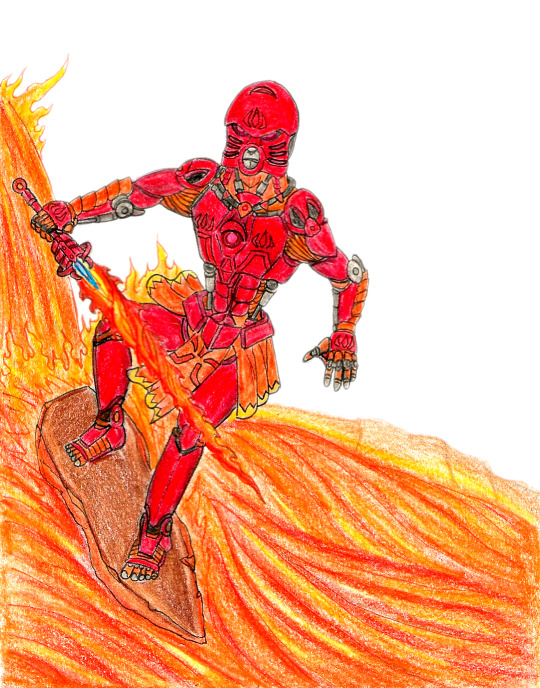
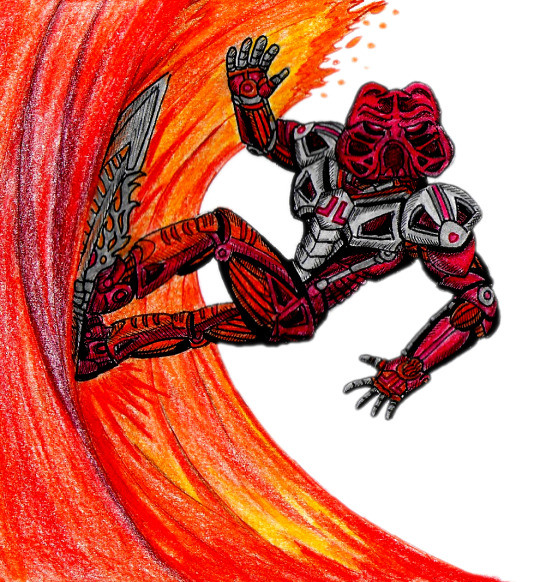
My First and Favorite Bionicle Character, Tahu the Toa of Fire.
I fondly remember when I got my first Bionicle when I was 4. I was looking around the Toy aisles for a Knight, nothing specific I just really wanted to find a Knight of some kind and was starting to get disappointed, then my father suggested I check the Lego section and there I saw him...a Red Hot Robotic Knight-like Warrior with a Fire Sword Surfing on a wave of Lava! I was smitten with him instantly and since then Bionicle has stuck with me as a series that is dear to me and an inspiration for my current work.
In honor of where it all began, I decided to draw my own version of all of the original Toa Canister art for each of the 6 original Toa.
Tahu is the courageous and determined leader of the Toa Mata, as well as the fiercest and most feared warrior among them. Early on he was a stubborn prideful hothead, he lacked patience, and had a wild flaming temper often leaping into conflicts and clashing with the other Toa (Mainly Kopaka) however his unapologetic brash attitude were sometimes his best traits, He does not stop at any point to mope or feel bad about his mistakes or missteps, instead he immediately course corrects and keeps moving forwards to do better.
Tahu is Loyal, Selfless, and cares deeply about all of his comrades as well as the Matoran and Turaga he protects; He takes his duties as a Leader very seriously and his biggest fear is leading his friends into a situation they weren't ready for and getting everybody killed, so he would often rather try carry the brunt of the problems himself and handle everything before eventually admitting he needs his friends beside him and has faith in all of their abilities, not just his own, transitioning from being the Warrior to a True Leader.
When first confronting the Makuta as a team the Toa merged into more powerful Toa Kaita forms representing the spirits of Wisdom and Valor allowing them to defeat a seemingly insurmountable foe, but as they entered the Makuta's lair their forms were reverted into their original selves. Pohatu and Lewa started to despair that the Makuta would be an even more powerful foe than the ones they just fought and without the power brought by the Toa Kaita forms they had no hope to win. In this moment Tahu tells them "Where wisdom and valor fail, all that remains is faith. And it can overcome all."
Primary Mask: Kanohi Hau (Mask of Shielding) His mask allows him to project force fields to protect himself and those close by.
#bionicle#Toa#bionicle toa#toa mata#Toa Nuva#Tahu#toa tahu#Toa Tahu Nuva#Tahu Nuva#toa of fire#Fire#Lava#Surfing#Lava Surfing#Hero#Sword#swords#my art
34 notes
·
View notes
Note
(Pasting this from a YouTube comment I made cause I’m lazy)
This is a very unpopular opinion, but one of the biggest things that bothered me about season 2 was Ed. People are always like "Oh you just can't handle a messy gay" or something like that when Ed's arc is criticized in season 2, but I dislike it because I feel it SIMPLIFIES him too much. Ed in season 1 just felt so much like a real person, a complex man capable of multiple contradictions equally within him at once, not one or the other battling for dominance in separate opposition. In season 2, it feels he is bad, or good, poison, or positivity, never both. Gone is the man making mistakes born of insecurity and a confused sense of self that hurts the ones he, in spite of this, deeply and openly loves. Now it feels like, narratively, his flaws and missteps must be pushed away completely for love to flourish within him. He seems so much more immature than season 1 would've ever lead me to believe, even in the episode 10 “kraken” sequence. Putting someone in a potato sack and a cat bell and having the ones he literally traumatized be like "eh alright, he's harmless now" is neither realistic nor satisfying. (Actually it was a misstep in my opinion to have him commit absolutely overboard atrocities in the first place. I don’t care how many people try to convince me he was this cartoonishly violent and scary all along, it does not fit the character I saw the entire damn season.) It's not in anyway engaging in the meaningful reconciliation of a very complex adult man, his wrongdoings, and his desires.
hi anon!
you raise a lot of good points in terms of what season 2 ultimately failed to do. it ultimately failed to live up to its own hype and premise.
the whole Kraken arc at the beginning of the season was a lot. and there's a reason Ed was basically killed for it and brought back to life by the power of looooove. which is all fine and good because this is a show that doesn't take realism all that seriously but in that case i don't think it gives the fallout of the Kraken arc any room to breathe.
i mean Lucius said it best when he was like "So we're all just going to continue on" or something along those lines. like he's purposefully asking, as the man who was shoved off the ship and left for dead, that everyone's just going to move on and... they do! the plot just does move on! and we're supposed to treat Lucius shoving Ed off the boat as like something equal to what Ed did to him? i just don't buy it. it doesn't feel satisfying. there's no emotional catharsis for any of these characters because everyone feels hollow.
it feels really messy. like there's no breathing room for this major story arc of abused people being capable of abuse themselves. which could have been explored well in a show like this but ultimately it gets nerfed by being in the hell era of streaming we're in where you only get 8 episodes a pop so good luck trying to do any of that
but you are right in that this season simplifies Ed. he feels aimless and not in a good way. like did we really have to have the Pop Pop scene? was that really worth the screen time? there were just a lot of missed opportunities in this season
20 notes
·
View notes
Note
3, 4, 22
3. Do they multiclass? Why (not)?
Out of character, not technically because I didn't realize you could in the game. In-game, sort of. I put her in College of Valor so she'd get buffs with swords so she's vaguely a fighter as well as a bard. She's- not unlike Flynn Rider in terms of fighter style and I think it's hilarious.
4. Is there a reason why your Tav starts out as Level 1?
She only ever made it to level 5 in Dragon Heist so her losing that wasn't the biggest of deals to me outta game. In-game, I figure she's been out of practice with combat for one thing and the tadpole gave her a setback for another.
22. What is your Tav's first impression of the other companions (Astarion, Gale, Karlach, Wyll ...)
Astarion: An annoying rogue. Seriously, what a cunt for trying to slit her throat, hahaha. Her opinion isn't improved when he tries to drink her blood.
Gale: He's a guy with his head clear up his own arsehole. That's hilarious given the fact he needed help out of his portal. She's immediately amused. Also mildly annoyed. Cue eyeroll.
Halsin: He's her new big tiddy earth boyfriend He's physically strong but he's got depth to him. He isn't just a meathead; he's really wise, and has good advice to hand out when asked. He's concerned about nature, about the shadow curse, and yet still wants to help everyone after you help him. Can also be a bear??? 10/10.
Jaheira: She's a legend, but she could stand to trust a little more. A really dumb/naive thing for Alaara to think given all that Jaheira's seen and done just before they met. They get along well after she decides to join them. Alaara prods the hell outta her before then though.
Karlach: I bungled this one so hard lads. Just fucked it up entirely. We killed her because I made a misstep with Sazza. BUT Alaara would have very immediately loved her had I not been a silly goose. (I thought about it when playing as her sister, who did recruit her LOL). Also a bit scared for her life when Karlach rages post-paladin battle.
Lae'zel: Stiff and stern as a flipping board. She can get the job done. A strong ally to have in such dangerous times.
Minthara: Didn't realize I could recruit her so she died lmao. But like with Karlach I've ideas. She'd feel anger before the grove thing was done, because this woman wants to wipe out all these people? Death to you, lady. But then she gains sympathy once they get to Moonrise and see she was forced into doing what she had.
Shadowheart: Catty as fuck. She needs to take the stick out of her ass and be a team player.
Wyll: An absolute character. Corny, but she likes corny. Just a gosh darned delight, and a most welcome addition to the party. Look at him.
Scratch and the owlbear: The best boys ever.
1 note
·
View note
Video
tumblr
The Making (and Re-Making) of Timothée Chalamet
BY DANIEL RILEY / PHOTOGRAPHY BY RENELL MEDRANO
He found superstardom and artistic acclaim instantaneously. Now, with unique candor, the actor of a generation reveals what it’s like to come of age in our very upside-down era.
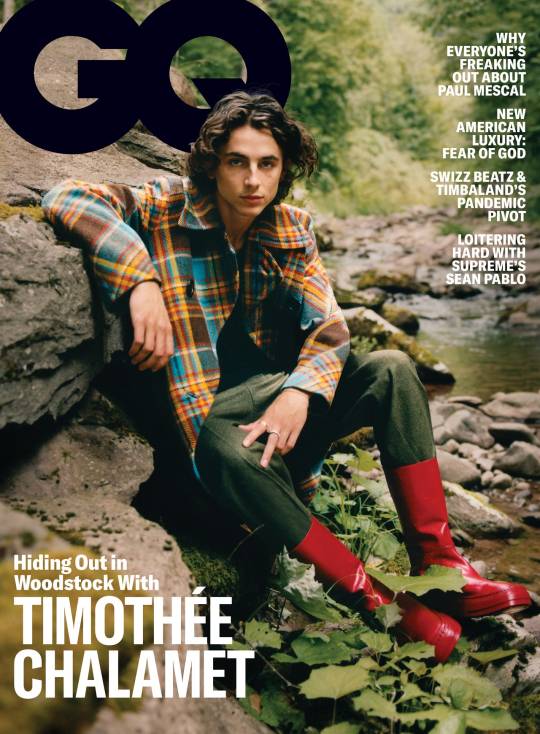
The day after the Oscars in 2018, everything that had changed, changed back again. Timothée Chalamet had spent the previous months becoming known. He had acted in a film, Call Me by Your Name, which was critically acclaimed as well as an instant object of cultish admiration—and his performance had made him, at 22, the youngest person nominated for best actor in 80 years. He had, simultaneously, been transformed into the rarest of pop confections—fawned over by younger women, older men, and every demographic in between. And he had traveled without pause on the awards circuit since early autumn, back and forth from New York and Los Angeles, practically living out of the first-class lounge and the lobbies of the Bowery Hotel and the Sunset Tower.
But the day after the Oscars, the moment the clock struck midnight and his carriage turned into a pumpkin, Chalamet was right back where he'd been before the whole fantasy had begun: in New York, with no credit card, no apartment, and no longer any structured demands on his time and attention. Outsiders who had witnessed the arrival may have regarded this 22-year-old as being in possession of wealth and clout, but he was suddenly back on his own dime, which amounted to maybe five or six dimes, reticent to stay with family and friends whose lives he felt he was disrupting with all his new baggage. Of course they couldn't possibly comprehend the chemical reaction that had just transpired. They were still hydrogen and oxygen, and Timothée Chalamet was all of a sudden water.
And so, for three weeks, he disappeared into the wallpaper of the Lower East Side. Specifically, the wallpaper of a little apartment that the French street artist JR kept for visiting collaborators. Chalamet holed up against the ugly New York weather of late winter, and did the only thing he could think to do: learn lines. The King would be his first film since his pivot into fame, and he was anxious to get back to acting after such a long stretch of merely talking about acting. Even more, he needed to blot out the unrecognizable icon the internet was already beginning to make of Timothée Chalamet.
I met Timothée for the first time at the onset of that initial blush of fame, when all of us were being introduced to an actor who had both rare talent and the un-engineerable it that chings like an audible sparkle off a jewel in a cartoon. I wrote a story for this magazine about that first chapter in the arrival of a film star. This is the second chapter, the story of what's happened since. It wasn't evident yet, but those three weeks in New York in 2018 were the starting line of what would amount to a 30-month stretch of four new films, two new Oscar campaigns, some refreshing romance, an incessant awareness of the confusing image of himself as—what else to call it?—an emerging global movie star, and a constant concerted effort to figure himself out as both a young actor and a young person in the unceasing spotlight.
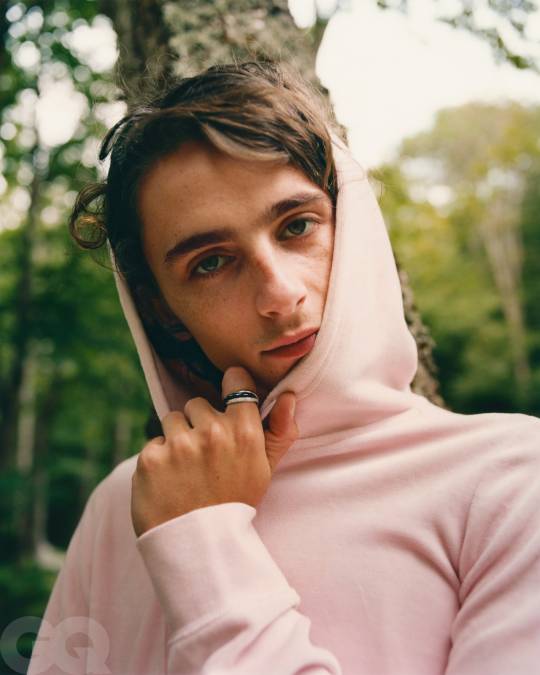
This summer, we were talking about all this on a little screened porch out back of a modest cabin in Woodstock when Chalamet recalled those three weeks. “My world had flipped,” he said. “But if I kicked it with my friends, things could still feel the same. I was trying to marry these two realities. But I don't even think I knew that was what I was doing. That dissonance was real. And thank God. Because I feel like if I'd caught up to it immediately, I would've been a psychopath or something.”
Out on that porch, I asked him a version of the same question over and over: What had the last two and a half years been like for him, as a human being? His response was a multi-hour monologue that I would characterize as: intense. He expressed unadulterated gratitude for his great good fortune. But he also expressed confusion and tension. He is firmly in a moment when he is concerned that everything he says or does or thinks will look or sound wrong. He backtracked a lot (“Wait, let me try that again”). He jumped on and off the record (“Sorry, sorry, sorry, this is just for you…”). It was important for me to know, he said, in order to communicate the context of his experience, if not the specifics.
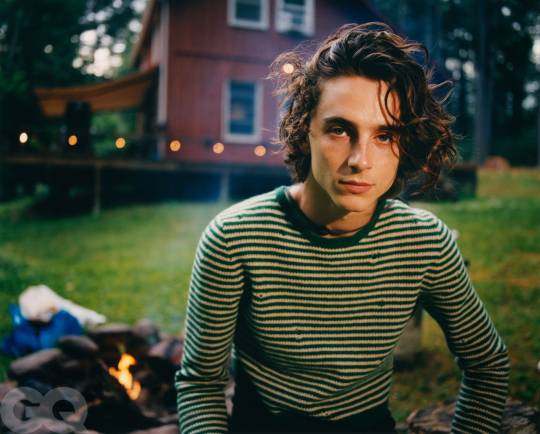
.
“I want to get back to the undefined space again. I'm chasing a feeling.”
He lives in the same world all of us do—only with the potential for adoration and blowback turned up to 11. He seems, at once, to trust his own instincts while also second-guessing most thoughts the moment he's convinced of them. It is an exhausting way to be. At times, when he was up on his feet, in his T-shirt and shorts, pacing around the little screened porch, hands tugging at his mane, I could feel the gears grinding to the point of smoke. He wanted so desperately to get this right, to express what he really meant, to feel the right feelings, to live the right way, to be the right kind of man for the people in his life that he knows he can and should be, despite everything else, despite the noise. He's doing his best.
Timothée had rented the house for the month of July, as a little escape but also as an opportunity. He was slated to play Bob Dylan in a new biopic. No telling when it might film, given everything, but for now he had more time to himself than he'd had in years, which meant time to maybe huff the vapors of some Woodstock Dylanalia. “It's not like I'm suffering from lack of connection otherwise,” he said, “but it just really feels like I'm connecting to something here.” When he arrived, he discovered that his little house had a wall devoted to Dylan—to the albums he'd recorded in the run-up to his timeout in Woodstock in the late '60s. Timothée relished happening upon that wall his first day in the Airbnb. The universe offered signs if you nudged it toward coherence.
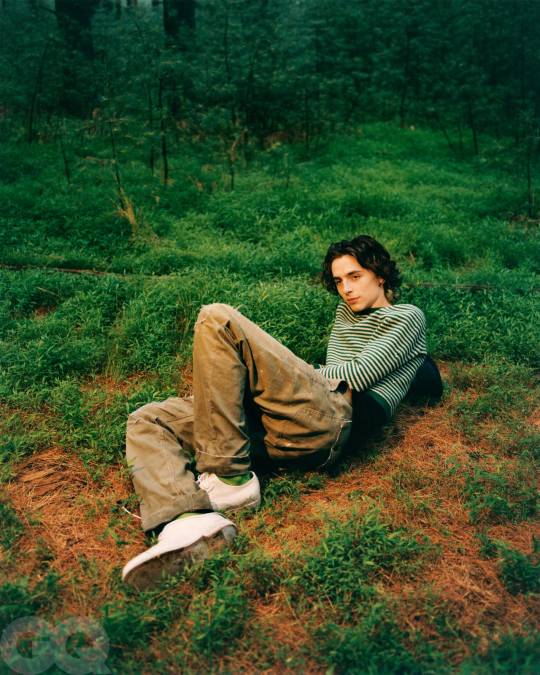
He knew what the cabin might seem like—like some young actor taking himself way too seriously, “treating himself like an artist.” But he was back and forth between Woodstock and New York all month, bombing up and down the interstate in the Honda sedan he'd rented from Enterprise. (He learned how to drive on Beautiful Boy.) All the while Dylan was top of mind. Timothée was late to the party but helplessly obsessed. He quoted him generously. He fixated on both the art and the persona. He marveled at the way the artist could be out there so much, making such an impact, while also keeping the real person obscured behind the music, the characters in the songs, the language. In the city, we spent time walking around Greenwich Village, Timothée in an identity-concealing face mask and bucket hat and sunglasses, able to search out old Dylan addresses in an invisibility cloak. He ran from site to site, with notes he'd kept while reading Dylan's memoir, Chronicles: Volume One, barreling up stairs and peering into windows. He was a 24-year-old actor, taking advantage of the pause between the second phase of his career and the third and thinking hard, daily, about how to play the next few years.
He rented the house in Woodstock, too, so that he could have a little space all to himself. He craved the privacy to try things and to fuck up. To make small mistakes now, out of view, when it was just him, when he was still young, so that he didn't have to worry about it later. At one point, he stood up and slapped an empty water bottle off the table so that it clattered against the screen of the porch. “I want to know what that sounds like!” he shouted. He hadn't taken many missteps yet, and it made him uncomfortable, wary, that he would someday. The month felt like a controlled burn. In the most innocent way, that was what Woodstock was about. He got to practice his guitar and harmonica in peace, cook himself his “shitty pasta” without judgment, permit himself space to keep growing up. So much was in the spotlight now. But in that cabin, he could sit on the couch for a while and re-familiarize himself with “the crease in the cushion” that he'd lost touch with over the past few years. The quiet. The stillness. That sunlight there coming through the trees. He could breathe a little. Sleep a little. It had all been so good for him so far. But the goodness made him anxious. When will the other shoe drop? Not there. He'd deleted Instagram off his phone. He'd stopped posting on Twitter. He was reading again. Listening to albums all the way through. Slowing down. What was it like to have lived these past two and a half years? It was like a lot of things, but here at the end of it, it just felt good to sleep.
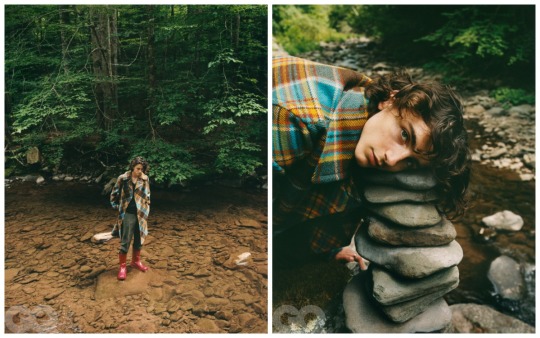
Back at the start of the 30-month run that led to Woodstock, Timothée turned over the keys to JR's studio and went to Europe to shoot The King. The role was like none of the films he'd just received notice for. “Here I am on set with all these Hungarian men with scars on their faces, and they're like, ‘You're the center of the shot, you're the badass! And we know you tried to put on all this weight, but like: You're wearing all the chain mail.’ If they took the chain mail off, my throat is still this big…” There he was trying to keep in perspective this new fame, this new validation, this new temptation toward ego, all while being thrust into the center of “something called The motherfucking King.”
When he returned to New York that summer, he skipped off the atmosphere again with another awkward reentry. One moment he was on the battlefield of the biggest-budget drama he'd yet experienced, the next he was “back in New York, on the A/C/E at Port Authority, just like, What the fuck is going on?” It was a pattern over the past few years. The calmly intense immersion into work, the “thud of lost purpose,” as he called it, when the work ended. It happened the same way in the fall of 2018 with Little Women—reunited with Greta Gerwig and Saoirse Ronan and the crew from Lady Bird. There was just an ease with which he plugged in with them, “a vocabulary of friendship” that existed there.
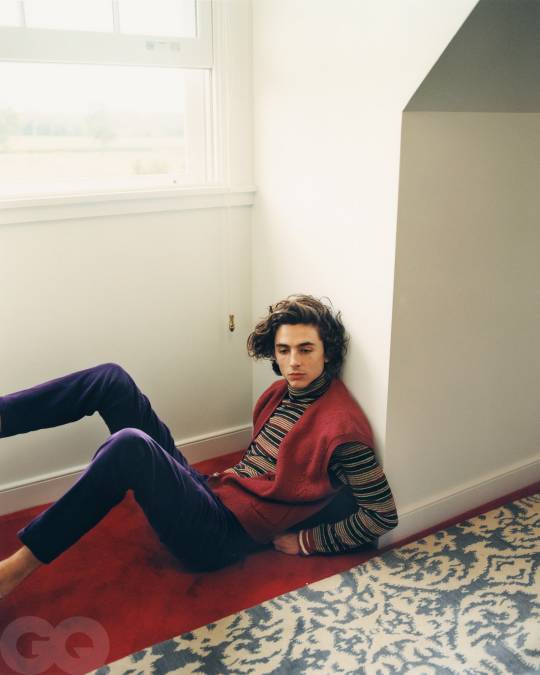
Timothée's career thus far has been filled with these sorts of friendships, notably those across generational lines. Even a casual observer may have picked up on it. Those glommings-on to older people in his life. Armie Hammer. Kid Cudi. Greta Gerwig. When I asked Gerwig to comment on the arc she's witnessed up close, from Lady Bird to Little Women, she wrote a note about “my friend Timmy”: “It's hard for me now, because I'm his friend, to see him strategically.… I love talking to him. We can get on the phone and talk for an hour or more without even realizing it, just skipping from subject to subject, making jokes, me feeling old and happy and him being funny and anxious and delightfully all over the place.” It's an odd gap he finds himself in—forced to be more accelerated than most 24-year-olds while also having not lived enough life yet to fit in absolutely with the people he enjoys spending time with most. On a recent visit with his grandmother in New York, she surprised him by saying, “I wish you would hang out with people your own age more often. It must be so weird.” It made him chuckle. Even she'd noticed. She might be right. But how could he resist the orbit of these creative geniuses he'd so long admired and who were filled with so much knowingness?
“I'm confident in the way I'm trying to approach things now, how I'm setting up the angles.”
In the winter of 2019, another Oscar campaign left him feeling disoriented all over again. Everything, Timothée said, was exactly the same as the first time except him. He'd put in this undeniable performance, but maybe one that sparked a little less for Oscar voters than that first kiss with a stranger. Now he was in all the same rooms as before, the same lunches and dinners and cocktail parties, shaking hands with the same Academy members who showed up at everything to get a little nibble of the freshest biscuit, growling ominous things at him, like: You don't have my vote yet.… “I really don't know how to talk about this stuff, man,” he told me, “because my experience of it is at the center of it. There's just some dark energy at these things, and this time around I felt like I could see it. And yet I'm thinking, Why isn't this going the exact same way?”
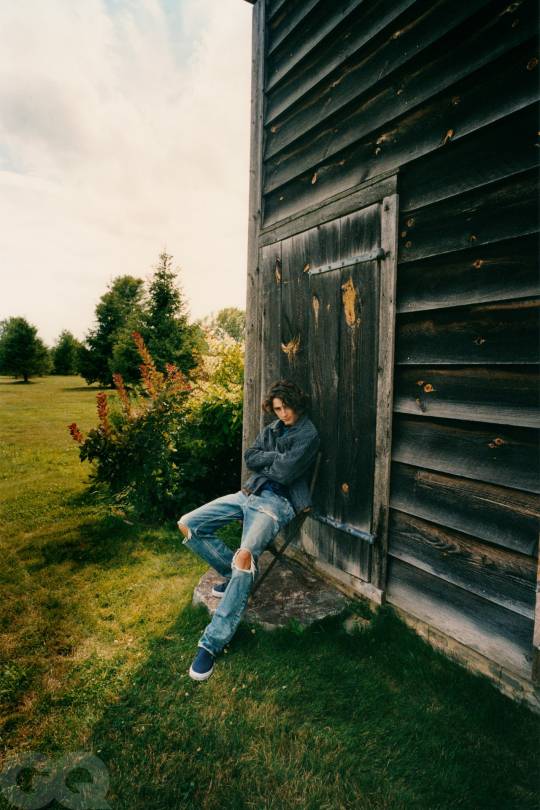
He wasn't nominated for Beautiful Boy, but the fresh air came, as it always seemed to, on the set of the next film: Wes Anderson's The French Dispatch. The movie is about a fictional English-language magazine (based on The New Yorker of the midcentury) and is structurally organized like the magazine itself, featuring short pieces at the “front” of the movie and a triptych of long features at the back. Timothée costars in the second feature, about a May '68-style student-protest leader named Zeffirelli and the middle-aged magazine journalist (Frances McDormand) assigned to report on his cause.
“I had seen Timmy in Lady Bird and Call Me by Your Name,” Anderson wrote to me, “and I never had the inconvenience of ever thinking of anybody else for this role even for a second. I knew he was exactly right, and plus: He speaks French and looks like he might actually have walked right out of an Éric Rohmer movie. Some time around 1985. A slow train from Paris, a backpack, a beach for 10 days in bad weather. He's not any kind of type—but the New Wave would have had a happy place for him.”
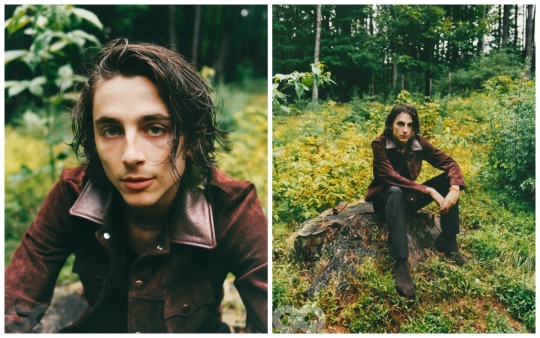
The privilege of early fame that Timothée most appreciates is the ability to choose the directors he works with. His role in The French Dispatch is a minor one, but it's a Wes Anderson movie—it's as simple as that. Due to the episodic nature of the film, some of the other “stories” were already being shot when Timothée arrived in Angoulême, a town that reminded him of the one he spent time in growing up, “so French it was like a caricature,” he said. Timothée had the opportunity, then, to hang with some of the elders he doesn't act with, like Jeffrey Wright, Bill Murray, and other seasoned members of the Wes Anderson troupe. “It was immediately as if it wasn't his first time with our group,” Anderson explained. “He was somehow already part of the family. The youngest member.”
Timothée had seen McDormand around for years, but he'd never felt like she was someone he could approach. “We'd shared an agent,” he said. “And it was no disrespect to me, but I hadn't been in any movies yet. What business do I have talking to Frances McDormand? But now, and this is the gift of acting, I really feel myself coming into my own as a community of thespians, as opposed to actors. And man, that sounds pretentious, but I just mean it's not about the fucked-up ladder of success and un-success, and being the guy or the girl, and then being off the list… That's not what I'm talking about with her on set, that's not what she's espousing to me. She's talking about a long career. She's talking about marriage with a creative partner and consultant. So to be able to have conversations like that and then a story line in the movie where they're kind of on an equal field? Even if she's an experienced, wise woman and he's an idealistic, naive boy? That's the exact relationship of exchange I want with my intergenerational peers.”
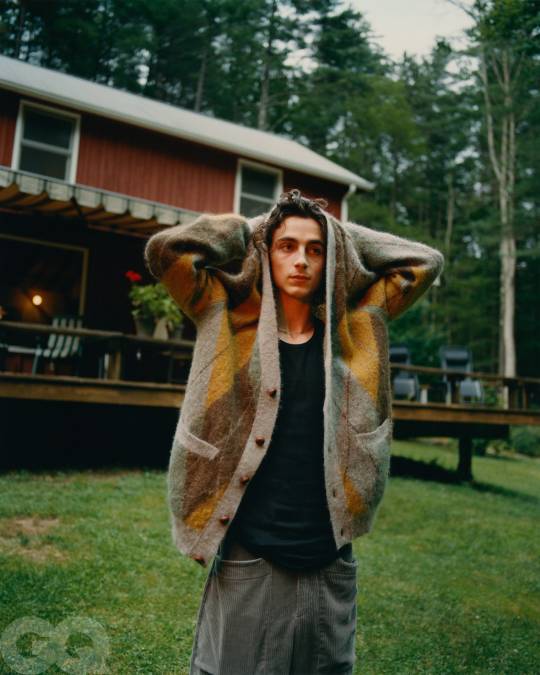
There's a particularly memorable scene in The French Dispatch, reporter and subject having fallen into bed together, when there's a knock at the door. Timothée looks at McDormand, anxious about who's there, mortified when McDormand informs him it's his mother. There, in that scene, we see all the desire of Zeffirelli—this energetic young man with all the right intentions, who strains to be intellectually and emotionally riper—clash with the reality of his age. It felt familiar to me, and no doubt to Timothée. It was some of my favorite acting in the film. I asked McDormand if there was anything in their scenes that struck her as particularly mature for someone his age. “Maturity is not something a fellow actor is the most concerned with,” she said. “Playfulness, discipline, and rigor. I do recall, during our scene in bed, the crew responding to his work with true respect for his focus. He was bringing it and we sat up and paid attention.” Anderson added: “I think my favorite moments with Timmy during a scene were the ones where I saw him pause and find a new attack. A new angle, which he does very clearly and assertively. What I love is how he will surprise you with something new, completely unexpected and perfect.”
One night, while McDormand was shooting a scene without Timothée, her husband, Joel Coen—he of the Brothers—asked Timothée if he wanted to go out for a steak. Over dinner, Timothée grilled Coen about Dylan. He knew Coen was a fan and had steeped in it on Inside Llewyn Davis. “He almost seemed weary of even talking about this stuff, it was so big and potent,” Timothée told me. But Coen noted that the truly incredible thing about Dylan was not so much the quality, which was obvious, but the quantity—the rapid amount of work in short succession, one groundbreaking album after another, in those early years. That takeaway resonated deeply with Timothée. Especially as he reflected on it from summer 2020, during the pause, during the moment of no work. That gush from Dylan made him want to work—harder, longer, better, more.
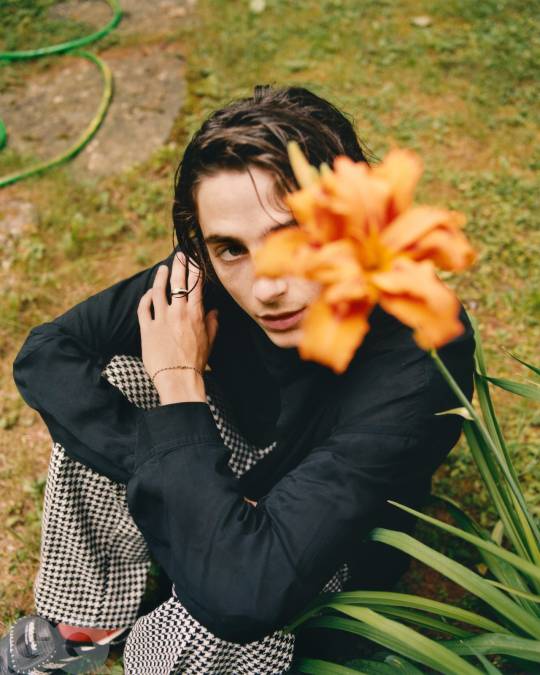
A week after our conversation in Woodstock, Timothée and I were in New York City, sitting on a bench along the Hudson, talking about what he's looking for when work resumes. “I want to get back to the undefined space again,” he said. “I'm chasing a feeling. When you think you're doing some great thing, it's probably something you've done before, and when you really fucking have no clue, that's when you're doing something on the edge, good or bad.”
Timothée's mask had slipped down his face as he was saying this, and two young women, about his age, approached cautiously. “Would you mind if we got a…,�� they asked, and he hopped up without hesitation. “How'd you recognize me?” he said, friendly, but genuinely curious, as if he hadn't just been shouting about art in a voice that sounded a lot like Laurie from Little Women or Timmy from late-night shows.
“Was it the scrawny limbs or the hair?” I asked him as he sat back down.
“Definitely the first.”
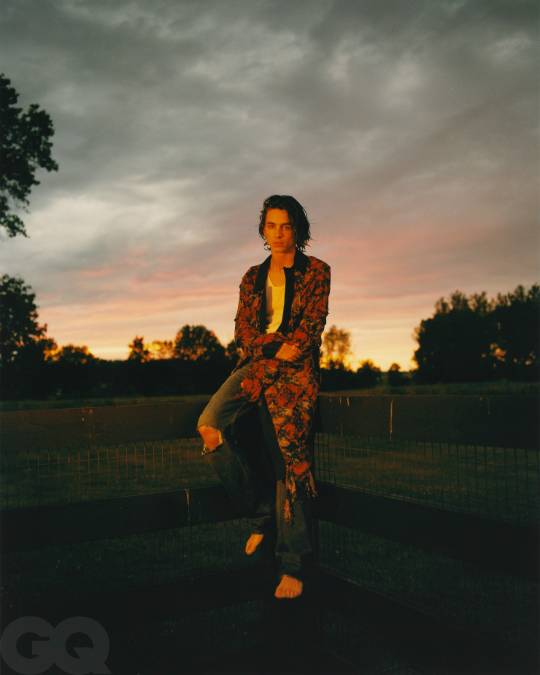
From France, last spring, it was straight to Hungary—right back to the exact apartment in Budapest he'd stayed in while shooting The King—to start work on Dune. Very few actors had become as famous without a blockbuster. And while he'd really gotten it down how to act on an indie set, how to make every second and every take count, he knew this would be something altogether different. It wasn't just the shoot that would prove taxing. A film of Dune's scale would likely be the can opener to a whole other stratum of Hollywood prominence.
Director Denis Villeneuve told me Timothée was his “first and only choice” to play Paul Atreides, “the one name on the page.” When they met to discuss the prospect, Villeneuve told Timothée how happy he was to finally meet the young actor. And Timothée had to remind him that they'd met before, when Timothée read for Villeneuve's Prisoners. “ ‘Of course!’ ” Villeneuve remembered. “He did a great audition, but he didn't physically fit the part. He was probably swearing at me because I didn't take him.” Timothée was party to so many stories like that one—glancing interactions with these heroes of his before he'd broken through. It reminded me of the relationship between freshmen and seniors in high school. The freshmen remember everything about the seniors; the seniors hardly notice the freshmen. But we all become peers eventually.
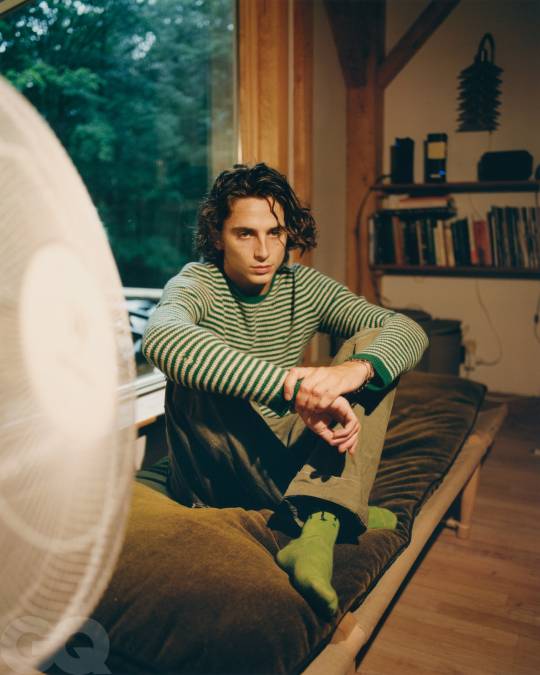
“I felt there was one being on this planet right now that would be able to portray Paul Atreides,” Villeneuve said—referring to the hero of the 1965 Frank Herbert novel, who transforms from an unassuming heir into a messiah figure, a charismatic outsider and commander of men and women (and sandworms). I read Dune for the first time this summer and was shocked by the source material, how much I'd consumed in culture that had borrowed from it. Star Wars. Alien. The Matrix. Game of Thrones. Paul, therefore, is a type we're familiar with but also possessing singular characteristics Villeneuve wanted Timothée for: “He has a deep, deep intelligence in the eyes. Something you cannot fake. The kid is brilliant. Very intellectual, very strong. And you see that in the eyes. He also has a very old soul. You feel that he has already lived through several lives. And at the same time, he looks so young on camera. Sometimes he'd look almost 14 years old. He has this kind of general youth in his features and the contrast with the old-soul quality in his eyes—it's a kid that knows more about life than his age. Finally: He has that beautiful charisma, the charisma of a rock star. That Paul will lead the whole population of a planet later. Timothée has that kind of instant charisma onscreen that you can find only sometimes in the Old Hollywood stars from the '20s. There's something of a romantic beauty to him. A cross of aristocracy and being a bum at the same time. I mean, Timothée is Paul Atreides for me. It was a big relief that he agreed, because I had no plan b.”
“If I get hit by a truck next week, I'm looking at 20 to 23, I don't know if you can top that.”
I asked Villeneuve if he noticed Timothée struggling at all to adjust to the larger-scale production. “It didn't show when he was on set, but I think for him the big thing was to learn how to create his own bubble on set. So that he would not have to try to be the friend of everyone. When you're on a smaller set, when there's 25 people, you can be friendly with 25 people. When there's 800 people around, you cannot be friends with 800 people.” He chuckled. “It's too much. So how to save your energy, how to focus, how to give himself permission to be in his bubble and make sure that his bubble is respected.”
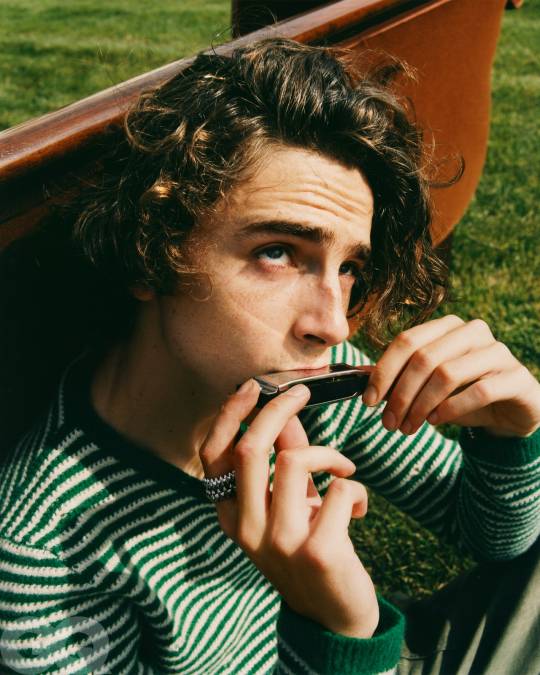
As ever, Timothée had a special affinity with those people on set who were a little older, a little wiser. Villeneuve said Timothée was constantly speaking with him and his wife in this open, vulnerable way about his concerns, his fears, how to deal with certain pressures. Villeneuve also described for me Timothée's relationships with his fellow actors, particularly the trio of Josh Brolin, Oscar Isaac, and Jason Momoa. “I felt like Timothée was deeply seduced—or maybe not seduced, but I just felt it was like a kid being with older brothers,” Villeneuve said. “He was younger, he was the little one on set, and everybody loved him. There's a scene in the movie where Timothée runs into the arms of Jason Momoa, and Jason grabs him like a puppy and lifts him into the air like he was a feather. And that's real! They really loved each other. It was very beautiful to see this young man being influenced by these people he admires.”
“His positive energy is infectious,” Zendaya, his nearest peer in the film, told me. “He really is so much fun to be around. We have very similar humor, and we can keep a joke going for a long time, but when the cameras start rolling and it's time to work, you can see it's game time, and he just taps into this brilliant intensity. It's awesome to witness.” Villeneuve underlined the energy as well, describing for me just having seen Timothée the night before we spoke, and marveling at “that beautiful, strong candor.”
“I will say that looking at Timothée working, I had a deep feeling that I was watching the birth of something,” Villeneuve added. “Not that it's for me—I say that with humility, because I feel that birth in all the movies he's done so far. I'm feeling it's someone that has insane potential. When I say potential, I don't want to reduce what he's doing right now, not at all. It's just that sometimes you are in front of somebody and you have the feeling you are in contact with a strong artist and that artist, his identity is still growing, building itself, learning its boundaries, learning how to protect some part of it. I think that we are witnessing something beautiful right now.”
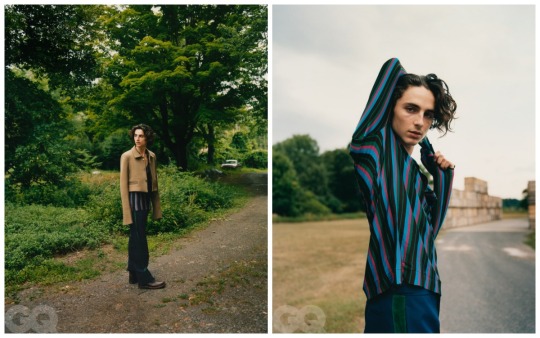
At the end of summer 2019, Timothée finally resurfaced from Planet Dune. He had been on social media only sporadically while shooting for most of 2019, and so, for his vast base of fans, it was an overdue glimpse of the object of their affection. First up was the Venice Film Festival and the premiere of The King. There were clothes and Kid Cudi cameos and charming red-carpet interviews. It was an example of the sort of stretch, in the gaps between shoots, when Timothée could indulge his passions for hip-hop and fashion and all these things he'd loved all his life that were suddenly accessible. It was another of the delirious disorientations of the past few years—the way that people who were once subjects of his intense fandom were suddenly a part of his life as friends or acquaintances happy to have him around. He might still embarrass himself at times, helplessly rapping back lyrics to his hip-hop heroes or gushing like a broken dam about new music or clothes or art made by the makers in his life, but they were cool with him so long as he actually kept his cool.
Timothée also spent the end of last summer promoting The King, alongside his costar Lily-Rose Depp, whom he'd been dating for about a year. He is serious about keeping his former relationship with Depp to himself, but he did share one very sweet, very funny, very sad anecdote that encapsulates the spectrum of great and terrible that accompanies the private life of someone new to mega-fame like Timothée.
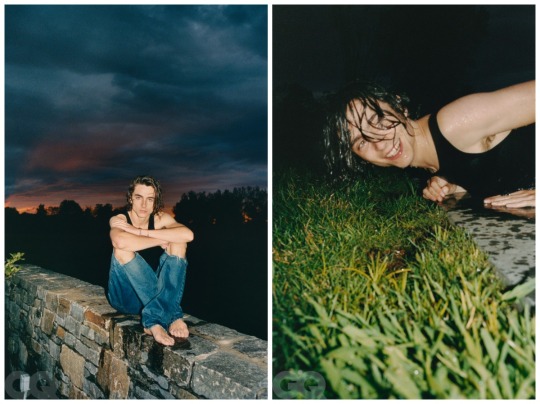
After Venice, he and Lily-Rose took a few days for themselves in Capri, where they were photographed by paparazzi. One image, in particular, circulated in which they were making out on the deck of a boat. Timothée is contorting himself into the kiss and looks a little awkward. Many people had their laughs. And some even suggested that the photo was staged for publicity. “I went to bed that night thinking that was one of the best days of my life,” Timothée told me. “I was on this boat all day with someone I really loved, and closing my eyes, I was like, indisputably, ‘That was great.’ And then waking up to all these pictures, and feeling embarrassed, and looking like a real nob? All pale? And then people are like: This is a P.R. stunt. A P.R. stunt?! Do you think I'd want to look like that in front of all of you?!”
This was how things worked now. He'd disappeared into those four straight films and emerged into a new paradigm—one that followed him into the holiday season of last year and a whole new level of exposure with Little Women. Here was this film about sisterhood, female intimacy, and a feminist critique of art and commerce. And yet Timothée was still the shiniest object in the set for so many fans. “I'm very used to answering questions about Timothée's hair from 15-year-old girls,” Saoirse Ronan joked with me. “I imagine that's probably what you're going to ask me about?”
Ronan has the unique perspective of having filmed and then promoted two movies with Chalamet during the past three years, and has as clear an eye as anyone onto this early phase of his career. “He's had such incredible opportunities, and he doesn't let the reality of that pass him by,” she said. “He's incredibly gracious and grateful in relation to his work and the people he works with. I think he's become more open as an actor. He knows his instrument more. I think he works even harder now because there are projects that are on his shoulders in a way that they weren't before. And of course he's been totally catapulted into this whole other realm of attention and notoriety. So he's also having to balance the incredible fame and attention, which would completely freak me out if it was something I had to go through.”
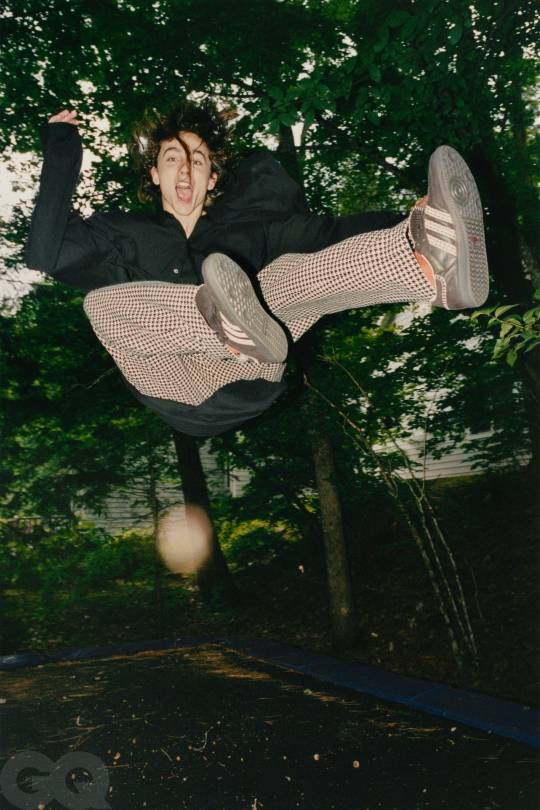
.
“I've realized that as much as these heroes of mine mean to me, and as grateful as I am when they offer me advice, even they acknowledge it's just a different thing now.”
When Timothée and I were sitting by the Hudson that afternoon back in summer, there were those two young women who approached him for a photo. But there were also two other young women who caught an eyeful of his profile as they strolled by and then surreptitiously positioned themselves out of his sight line but still in mine. They did that thing where one pretends to take a picture of the other while actually shooting back over her shoulder in selfie mode. That charade went on for five minutes or so while Timothée exercised his guts about reuniting with Gerwig and Ronan on Little Women, and though I was nodding along, I was also marveling at the lengths to which those two fans were willing to go to get a picture of him.
I asked Ronan what she's noticed about that level of attention, sitting beside him for so much of it. “I'm always kind of shocked by those things—when any one person can just completely take over people's lives so much,” she said, laughing a little incredulously. “But I'm also not surprised. There just aren't many other young male actors out there like him, who are able to hold an audience in the way that he does. His look is so magnetic and beautiful. One of the things that we spoke about a lot when we were doing Little Women, in terms of our characters, but also in terms of myself and him as people, is that we both have this masculinity and femininity equally. And I think that that's one of his strengths, is that he can be incredibly sort of feminine and sensitive and sensual, and also he's a guy that, you know, girls fancy. So he covers so much ground in terms of popularity. But at the end of the day, he's always gonna have this skill. He can be cute, but that only gets you so far.… And so I've seen him learn how to separate himself from all that other stuff when he's on set, when he's working.”
In Woodstock, Timothée had described to me with greatest admiration the way that Ronan can act in these films, at this highest level of acclaim and attention, but also remove herself, uncomplicatedly, from all the fuss: “She is like a superhero when it comes to this sort of thing, going through it so healthy—with the asterisk being excellent work across the board and four Oscar nominations. I think her, like, DNA of self is really morally right.” She knows herself extremely well, he said, and has the confidence to give up only so much of herself. Whereas he feels he is calibrating constantly how much of his true self to reveal. “Saoirse's one of my best friends in the world—at least I think we're best friends. And she's never judged me for…the Coachella of it all.” That is, the part of him that can't resist fanning out backstage with his favorite musicians or occasionally allowing himself to be in the spotlight even as he talks about preserving his privacy.
“He's 24, and he's gonna have a great time, and I would never judge him. I've been to Coachella; I just never got photographed at Coachella,” Ronan said, chuckling. “But yeah, we talk about that sort of stuff all the time. We've weirdly gone through this together for the last few years. We've both become more accessible. But he's had one sort of attention—I do feel like boys get it on a whole other level. I know that ultimately what he wants is to be good at his job. And that will always steer him on the right path. I've always let him know, and he's always let me know, we can talk to each other, and we do. He has good people around him, and I'm one of them, and Greta as well—we all kind of look out for one another.”
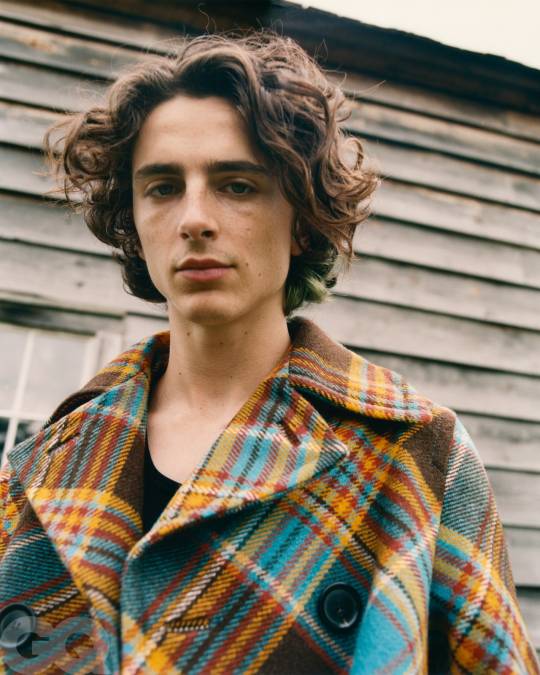
Timothée spent late May and early June asking questions of himself: What can I do? What is my role in all this? He felt conflicted when he sprang to action and conflicted when he stood still. But never did things feel less uncertain, less self-conscious, than when he was marching, anonymously, alongside hundreds or thousands of others in Los Angeles in the wake of the murder of George Floyd. It was an active way to participate—meaningful action, without being showy, without flexing any of the levers of fame or power. He was going to get hit no matter what he did, so he tried to follow his instincts of what felt humble, responsible, right.
“This idea,” he said, “that power is the mass body politic organized—and how many bodies can you get together—that makes sense to me.” He didn't disappear but, rather, stripped himself of his him-ness and became one body, among many, taking up space and participating in an unequivocal statement. “With a mask, a hood, a hat, glasses—my face is deleted,” he explained, “and I'm literally presenting a physical form, you know?” A single body in space that, like a vote cast in an election, is democracy embodied, but anonymous. The same unit of power as anyone else. “People might find it disingenuous, but I found it really grounding,” he said. “It was Oh shit, I don't feel out of place—and yet I haven't been in a crowd like this for years.”
He spent much of the summer talking with others about how a person should be in a cultural and political moment such as this one. “After a day of protests,” he said, “I'd ask friends if they ‘felt good.’ If we do, is it a good thing to feel good, or does that mean we're doing it for the wrong reasons? How much do I want to put on social media? Is it a virtue signal to put it on social media? But all social media is performative, right?” I heard him ask dozens of self-interrogating questions like these. He cares so genuinely about doing the right thing, about doing well by his family, his friends, and his fans. But he didn't want to misuse his privilege or his platform, to overreach so that the gravity of his fame sucked up anything from anyone else whose moment it was to speak. He didn't want to take up room; he wanted to help center other voices. On Instagram, he posted videos each day during the first week of marches in Los Angeles—no directives into camera, just an implicit charge to his followers: Show up. Listen. Be a body.
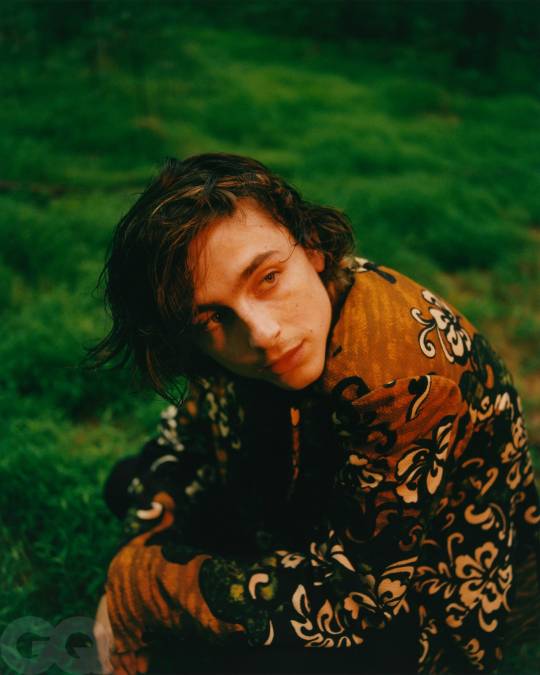
“I have so many thoughts on so much of it,” he said, “but I don't see the benefit of putting it down for consumption until I've really worked out exactly how I feel about it all. Who benefits from my half-baked ideas?” Who cannot relate to this in 2020? Who would want any of their dinnertime conversations with family and friends these past months chiseled into the stone of the internet? “I care so much about this stuff. But I would never want my caring to be misconstrued. I don't want my caring to be about me in any way.”
God, this stuff twisted him up. He knows how much has gone his way. But from the summit of good fortune and power, is it better to speak constantly—or to shut up, put on the glasses, pull down the hood, and live and act according to one's convictions as one individual among many individuals? To march. To vote. To speak through action rather than words. Staying in motion, showing up, being a body—it's a good place to start while he works out the rest of how he's meant to live a life true to his values with everyone watching.
He's seeking out the right path, the right people—with help from his “intergenerational peers” and Dylan and anyone else he can find. He wants the benefit of their knowledge and experience, and he's okay if it's slow going to accrue it. He's open to playing the role of the novice still. But there have also been things in his life these past of couple years that have made him realize, as he puts it, “adults are just kids a little bit older.” When he returned to New York from Los Angeles this summer, it wasn't to his childhood apartment or to a borrowed living space of an acquaintance. It was to his very own apartment, his first, in a little wedge of Manhattan he loved for being nowhere, but on the edge of several somewheres. He relished the mundanity of setting up his own place. To hear him talk about a first trip to CB2 was like hearing another person talk about their first trip to a movie set. “But I think if people saw what my apartment looked like, they'd be like, ‘Oh! This kid has no fucking clue what he's doing.’ ” He is so young and he is so old. It is his gift. He is so patient when he can suppress being so restless. So careful with the long arc of a career when he can resist obsessing over the instant. He is so confident when he centers on the work and so searching when he gets sucked down into questions about the rest of his life. Will he always be this way? This pliable and open? This self-reflective and intentional? He trusted so little of his new life, but he trusted his talent. That was the key. He knew he was as good as anyone at playing other people, even if he was still figuring out how to play himself.
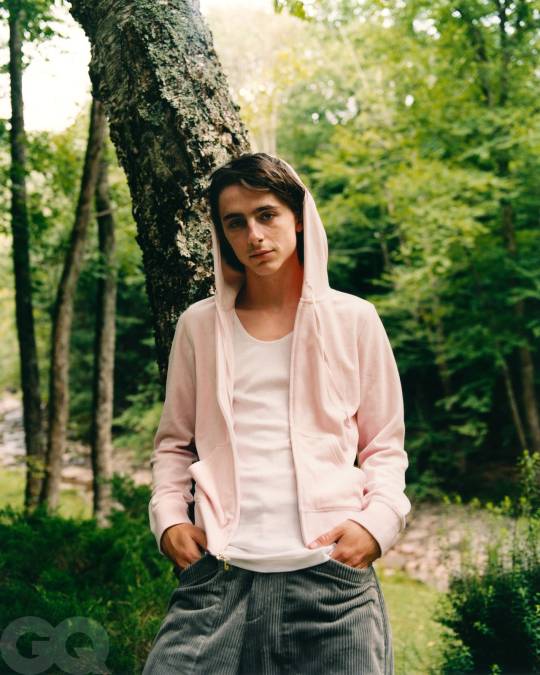
We spent a good amount of time in Woodstock and in New York City and on the phone talking about where his career might take him from here. With great humility, he acknowledges his skill. But he has been thinking a lot about the difference between preternatural talent and mastery—the work that's required to ascend from that floor of young greatness to the ceiling of realized potential. That said, he's wise enough to know that his career could pivot in an entirely different direction—that the world could change or the opportunities could dry up or “eventually there's gonna be an Oscar Isaac in his 30s who's gonna bust out of Juilliard who's gonna be the next great actor and make me feel like a piece of shit. But right now…”
He told me, “If I get hit by a truck next week, I'm looking at 20 to 23, I don't know if you can top that.” To show up with Call Me by Your Name—he knows that that film was a unicorn, the sort an actor works his whole life to find. And the immediate Oscar nomination had freed him up to not spend the rest of his career chasing a certain kind of role that might lead to a certain kind of validation. “I'm not gonna be bashing my head against a wall trying to prove that I'm an actor,” he said. “The train can run over my leg and leave a track forever, and yet the point of entry for me…,” he said, trailing. “That's a good feeling.”
He looks at all these careers—all the careers you might expect: DiCaprio, Bale, Phoenix, Depp. And he does his best to separate the strands of each of their careers that might still apply to his. But all of the rules for acting success that those performers played by, for how to be in the public eye, for career arcs and longevity—those rules are irrelevant now. Hollywood is different, the media is different, fans are different, movies are different, the world is different. “I've realized that as much as these heroes of mine mean to me, and as grateful as I am when they offer me advice, even they acknowledge it's just a different thing now.”
And so it's occurring to him that the next few years will be Timothée finding the path that's right for him. Lately, he's thought about this next phase as shining a flashlight into the dark. There are potential projects that excite him considerably, some of which he's had a greater hand in engineering. There is, of course, the Dylan movie. But there's the question of how to spend the rest of the year, when most Hollywood productions are still paused. “The rest of the year,” he says, “I'm just thinking about Trump, man.” But after that…maybe Europe for a while? The Woodstock experiment did what he'd hoped it would—a little space, somewhere else. He would love to just breathe some different air again.
He was at another pivot point, as he had been when he and I were first together for Chapter 1. In the winter of 2018, the work had been validated, the public profile had developed suddenly. But the temptations, the confusion, the money—those were all lagging indicators. By mid-2020, all had caught up. And the money, in particular, was on his mind one afternoon in New York. We were talking about how a person might stay true to one's roots with that sort of thing when the reality, for him at least, had changed with Dune. I told him that one of the things that seemed to differentiate him from young stars of the past, and perhaps was a feature of his generation, was the way that material possessions didn't consume him. He didn't buy much stuff. He didn't own a car or a house. He liked borrowing clothes, but not necessarily keeping them. He agreed with the characterization, but then got immediately twisted up about a potential future hypocrisy: “But Dan, what if I do grow to like fancy shit?!”
Boomeranging back home after the surreal adventures out in the world—that was a good and grounding thing for him. Over the weeks we were talking, he spent time with his folks, delivered some COVID groceries to his grandma, and was in touch with his sister daily. And in New York, he and I kept running into ghosts. One afternoon, when we crossed the West Side Highway at Houston Street, he gestured at the athletic complex at Pier 40, where he played soccer growing up. He scampered over to a vending machine there to grab a bottle of water. When he pulled open his wallet to pay, he had only twenties. “Bad metaphor! Bad metaphor!” he screamed, jumping away from the vending machine, as though it were one of the great threats to his selfhood. This was the sort of innocuous moment that will hum with outsize resonance for me when I think about Chapter 2 from the future. All the things that one would expect to happen had happened in the first two and a half years since the arrival of a comet, and yet he was suspicious of so much of it.
Here is another way I will remember him from this moment: sitting on that porch in Woodstock—breeze and birds in the trees, sunlight in the leaves—looking for a higher power. Or at least expressing openness, as a nonreligious person, to the idea of some central organizing force in the universe—because, given everything lately, there has to be or we're fucked, right? Some of these searching things he said to me could be mistaken as a person spinning out a little. But that wasn't it at all. There was such calm. There was such contentment with the grace that had been afforded his life and career thus far, and where each might take him next. He was questing, yes—but he was firmly at the controls. The flashlight in the dark. Someone moving forward with great confidence into the unknown, with eyes wide, mouth shut, and ears listening more than they ever had before. There were no models for how a person like him should be anymore. There were no longer any adults who weren't just kids a little bit older. There were no blueprints for how to shape a career—so much had changed. There was only a head and a heart, his, and a feeling for the moment. “Maybe I'll never do a great work of art again, but I just feel like I'm confident in the way I'm trying to approach things now, how I'm setting up the angles,” he said on that porch in Woodstock. “When you think about Dylan. When you think about what Joel Coen said about the rapidness of the art, I'm just like: Trust the beat of your own drum. Give this its best shot. Give your artistry its best shot.”
.
Daniel Riley is a GQ correspondent and the author of ‘Barcelona Days,’ which was published this past summer.
A version of this story originally appears in the November 2020 issue with the title "Wild Heart."
PRODUCTION CREDITS: Photographs by Renell Medrano Styled by Mobolaji Dawodu Tailoring by Ksenia Golub Produced by Wei-Li Wang at Hudson Hill Production
439 notes
·
View notes
Text
I got an ask for Qrow Branwen so here it comes !
My fav ship(s) for the character
I think my favorite ships for Qrow are Cloqwork and Fair Game ! Cloqwork lacked screentime in terms of canon content of course, but I love the potential here. I also have a things for shipping the sad men together xD There are a lot of REALLY great Cloqwork fanfics out there and I love seeing people write about these two <3 It's in the details but I think there's something interesting here. With Qrow who is convinced to be a curse, who came from such a harsh background... And with Ozpin who is so convinced of humanity's inherent goodness and that anyone deserves a chance. At the same time they're both very complicated people who I think would interact in cool ways. Ozpin is wise but does have a mischievous streak that I think also helped in making them both get along. Qrow is much more perceptive than he appears and that's also good for dealing with someone as secretive as Ozpin.
Fair Game also had a very good start ! The relationship was admittedly a bit tilted toward Qrow's recovery in the show, but they were nice to see together. Clover was perceptive & caring as well as patient. All great qualities for a relationship with Qrow, who has a hard time breaking down his walls and a shot mental health. At the same time, Atlas is very professional, straight-to-the-point and I think Qrow is a real breath of fresh hair in that environment. He brings a different viewpoint to the table, he's very loyal & caring and it's clear that his sass amused Clover greatly. We didn't get to learn enough about him, but Clover's VA hinted that Clover's trust was a fragile thing and he wasn't a fan of showing vulnerability. Qrow, who gives everything he has in all his relationships, would have been a great balm for that uncertainty. So yeah !
My least favorite ship(s) for the character
There are, of course, any & all ships between Qrow & the kids or Qrow & Salem's team. But outside of these obvious "nope", I'll have to go with Jailbirds. This is COMPLETELY personal but I have a really hard time liking Robyn's character as of V7 end/V8 so I'm barely interested in her dynamic with Qrow. I did appreciate her talking down Qrow from revenge because he was only doing it for his own sake but... That's about it. I find her way too abrasive (hidden behind her shiny Robinhood looks). And whereas Clover (imo) was pretty good at getting Qrow to face his issus head-on & building him up, I feel like Robyn relies more on humour & deflection... Which is an art Qrow is already acquainted with, and not the best coping mechanism for him. Aaaand I just feel like she put Clover down several time in order to lift Qrow up. That, plus the queerbaiting controversy, plus her having indirectly participated to Clover's death... The ship makes me a bit uncomfortable.
My fav & least fav platonic relationship(s) for the character
My fav platonic relationship for Qrow is his bond with Ruby ! I really hope they bring it back because these two were GREAT together. Ruby's admiration was adorable. Qrow's nonchalent but clearly protective streak. They care about each other A LOT and I really loved them together. I hope they can have more moments together like back in V3-V4 or V6.
I'm not sure what my least liked platonic relationship would be. Saying Robyn again feels like beating on a dead horse but I don't really have a problem with any other ones. They're all, if not kind & good for him, at least interesting (like Raven)
My favorite thing about the character
The combination of his sassy/cynic personnality and how loyal & caring of a person he actually he is. Qrow is rough around the edges, leans easily into banter but he cares so damn much. He fit so easily next to Ruby's peppy enthusiasm in Vol 1-3, and then he was just an incredible badass and yet so damn vulnerable human in Vol 4-6. I liked that about him. How all the pieces fit together
My biggest criticism for the character
Well I have 2 things to say about that. First : V7C12 With Friends like these. What the fuck was this episode qkfazkfhkgh Qrow's brain was nerfed SO DAMN HARD, I was genuinely pissed while watching the episode. This was just a string of dumb decisions from everyone except Tyrian. But I digress -
In a more general sense, I'd say... putting Qrow in the sidelines. Him falling further into depression was a sound decision. It was interesting and fitting of his character imo. But I feel like they tied "Ruby having enough of his alcooholism" and "Ruby growing away from adults" in a way that kind of.... just put Qrow to the side and doesn't allow him to do much. In V6 finale, Qrow expresses understandable concerns about their plan to steal an airship, but instead of dealing with that Ruby's frustration with his cynicism is aired out and... the timing kind of makes the whole thing weird becaus Qrow isn't allowed to disagree with their plan ("we'll do it with you or without you") and then has to trust Ruby and let her go which AGAIN is a great moment in itself. But all that put together just like... rid Qrow of his function as a parental figure because Ruby is the leader now and he's just... kind of following along.
When was their writing at the peak according to me (ex : best season)
Okay for this one Q, I'll have to go with Vol 4 and Vol 6 for very different reasons. V4 was great because we really got to get to know Qrow. His complicated relationship with Raven. How BADASS his encounter with Tyrian was I freaking loved it. What his semblance and how it shaped his life. And it also let him be vulnerable through the poison & seeing Ruby repay his care was very nice.
Vol 6 for fleshing out, taking his issues & drinking more seriously. Showing more hopelesness and cynicism, and that he had a real drinking problem and he wasn't just a fun drunk. Plus the loss of faith in Oz showed how much Qrow needs stability and secure certainties to orbit around despite his nonchalant personnality. But I like it a bit less because it was the starting point of putting him on the side kind of.
A song I think fits them & why
Ship in a Bottle (Steffan Argus) ➸ A song about being alone in your fight, in the sense that your life is like a sail on the ocean and you are the only captain, the only one who can choose what to do with it. At the same time, there are several mentions of a "captain" as if the singer/Qrow adresses someone else. It's reminiscent of his relation with Ozpin or Clover : speaking of a deal, of being honest and sharing what's on your mind. Qrow thinks too much, he's scared and he sinks more & more as he delves into his cynicism (V6). Qrow cries, things get worse, the mention of the glass echoes his struggle with alcooholism. And the Scarewrow loses his brain, "lose touch with all the things that made [him] feel sane."
+ Problem child (Simple Plan) The Star song (Amanda Palmer) Would anyone care (Citizen Soldier) Wasted (8 Graves)
A headcanon to make up about them
Qrow didn't have the most normal childhood and because of that he had to learn a lot for Ruby & Yang. Notably, Qrow had absolutely 0 notion of what was an appropriate presents for young girls. As a result, he tended to simply bring back from his travels whatever shiny thing might have caught his attention. Could be a weird flower. Could be a pretty knife. Or even junk that his corvid brain latched upon.
Tai designed a look(Tm) that Qrow learned to recognize as "No, not appropriate." After a while, Yang learned to mimick it (but rather at random, she didn't really recognze what was appropriate and what wasn't). Ruby always liked his presents though.
What I would change about them if I was making a re-write
I CLEARLY would rewrite V7C12 so that Qrow & Clover keep their brains kzjhfkqhzk There were ways to reach the same conclusion without like... having a Qrow-Tyran team-up which was REALLY weird
I see 2 main possibilities to stick close to canon content - After the crash, Tyrian gets free but he keeps playing dead for a bit. Since there is no 3rd menace, Clover and Qrow's argument devolve into a fight as seen in canon. At one point, Clover manages to briefly disarm Qrow. They discuss for a bit, you can even put the exact same dialog as in the ep. Then Tyrian takes action, moving out of the shadows to kill Clover with Qrow's discarded weapon. Braincells saved. OR - Instead of having Qrow & Tyrian outright team up, Tyrian just... keeps instillating doubts in their mind. Qrow & Clover are temporarily allies in taking Tyrian down but because of this, they don't TRUST each other which cause missteps and make them less effective. At one point, Qrow tries to attack Tyrian who is behind Clover. But because neither Qrow nor Clover really have faith in the other at that moment (and because Tyrian is poisonning their mind), Clover automatically steps back or aside. He doesn't entirely trust Qrow. Because of this small hesitation, Qrow's attack fails. Tyrian manages to disarm him. Tyrian uses Qrow's weapon to kill Clover. There could even be some message here about the lack of Trust & letting Salem divide friends... something of that caliber in any case 🤔 It can even parallel V3 where Qrow did the same thing with Ironwood & Ironwood refused to stand aside even if he thought Qrow meant to attack him... Could lead somewhere ! Like, in V3 Qrow had faith that Ironwood wasn't to blame. Only Ironwood feared that Qrow blamed him, but Qrow knew & trusted that Ironwood wasn't to blame. In other words, Salem didn't divide them. Here, Qrow & Clover let Tyrian get into their head. And as a result Clover dies. "Together we stand, Divided we fall"
My guess for their MBTI/Enneagram
I'm still mulling on it right now but I think he might be some kind of ISTP 416. He has some weird 7ish behaviour but his need to orbit around someone/a goal, his relationship with Oz, how close he stuck to Tai & Summer sounds closer to 6 fix. He wants people to go home to. Certainty and security. His independance definitely is there but seems emphasized moreso out of necessity.
One aspect that I think would be nice to delve deeper into ? (optional)
I'm not sure mhmmm maybe his relationship with Summer ? It would be both cute & interesting. As well as finally giving us insight into who Summer was
#rwby#qrow branwen#rwde#rwby thoughts#send asks#cloqwork#fair game#v7ch12#with friends like these#v7 spoilers#character song#enneagram#mbti#rwby rewrite
13 notes
·
View notes
Text
What Happened Is Not Right And That’s Okay (Chapter 2)
Ao3
Link to Chapter 1 Fandom: The Owl House Rating: T Warnings For this Chapter: Dehumanization, ableism, possible borderline gaslighting, and parental ignorance/neglect possibly bordering on child abuse. Relationships: Eda Clawthorne & Lilith Clawthorne, Eda Clawthorne & Eda Clawthorne’s Mother, Eda Clawthorne & Principal Bump (additional relationships to be added as the story progresses. Summary:Living with a curse was never a simple task. And really from day one Eda knew it was going to be complicated. But she can't help but wonder at times. Just why hers has to be this complicated.
In short: An Exploration of what life might have been like for Eda growing up with the curse. AN: Hey there so what story is basically what it says on the tin. With some creative liberty of course.
Something to keep in mind is that this story progresses: 1. Explore Eda's character and others in response to the curse 2. Help myself explore and come to terms with my own Chronic Illness 3. Help educate others who aren't as familiar with disabilities on the realities of the situation. This one is important to me since the fandom can have an ableism issue. And I would like for readers to maybe take away why the use of certain tropes is a lot worse than they might realize. 4. This story is not meant to be either tragedy or inspiration porn. 5. I've only really begun interacting with the disability community in the last few years. So if I do a misstep its unintentional ignorance. Which I realize is not great either. I just want to make clear my intent is not malicious. If someone else who is in the community in some form be it Neurotypical, disabled, chronically ill, etc. sees something questionable within the story that comes off as unintentionally ableist please tell me. I would be happy to clarify if the plot beat was unintentional (and fix it) or somehow deals with the story itself. Which will happen sometimes. 6. Some of this is based on my own experience. Some of it is not. The parents issue this chapter is a good example of it not being based on my own experience.
This story will touch on some topics that might be sensitive to some readers. I will include warnings . If your sensitive to the topic please keep that in mind before starting it. Also please bear in mind that not all chapters will have the same element. So while one chapter might have one issue, the other might not. A good example of this is an arc I will be exploring later in the story involving ableism in sports.
For anyone who wasn’t around for the first chapter. This was originally inspired by @beckyarteest‘s fic before it went off and became its own quasi multi chapter AU (I am bad at sticking to canon compliance): I'm getting old and I need something to rely on.
Anyways Actual story is under the read more. Ao3 link is at the top. Please let me know what you think!
One day turned into two and two turned quickly into a week. And after that with no real sign of the ‘curse’ resurfacing, Eda had actually started to think that maybe everyone else was right.
Maybe whatever had happened that day was just a one off thing.
Unfortunately, reality had made that hope come crashing down just over two weeks after “the duel that wasn’t” with Lilith.
=============
Eda wouldn’t remember the moment that would properly change everything about her life.
Though, she guessed that wasn’t entirely accurate. Considering the biggest moment had happened a week prior was when she had been supposed to be vying for an Emperor’s Coven spot against Lily. The day of her first transformation.
However the incident in potions class, the moment they now knew this was almost certainly not just a one off incident like they had been hoping? That was the moment it became all too real for Eda.
Even if it would be a while longer before it became real for the rest of the family. That was the day reality started to sink in for Eda. As it was the day that she knew at least to an extent that her life wasn’t going to ever be the same.
It would also be her first gateway into the many, many issues that came with the curse. Whether it be other people’s treatment of her cursed form, right or wrong, or just still having people take her seriously in the beginning.
Something that would be a recurring struggle she would have to deal with in the coming years.
Much like the duel, she would only be told what had happened afterward. The entire time she was transformed she wasn’t even aware of what was going on.
It was something that would over time become associated with fear and worry. At the time though, for an Eda who was still in denial, it was more of a source of annoyance.
Eda didn’t like that she had to rely on other people to necessarily do ‘the right thing’. Especially since in both instances so far it nearly hadn’t ended in her favor.
Thankfully of all people it was apparently Principle Bump who came to her rescue. Seeing reason when one of the other teachers had tried to suggest handing her off to the head of the Beast Keeping classes for the time being...
Bump scowled at that not particularly liking the way this conversation was going, “She is still a student. A transformed one but one nonetheless. Unless she starts attacking someone there is no reason to be summoning Arden.”
Sure, he may not be particularly fond of Eda’s antics at times. Sometimes he wished that the entire Clawthorne dynamic wasn’t like how it was. It was a source of many of his headaches.
But that did not mean he supported putting Eda in a cage.
Even if she wasn’t in her right mind currently, she was still a student. And she wasn’t being aggressive. Honestly, this other form so far hasn't been aggressive at all. Though who was to say that wouldn’t change?
He was more than a bit concerned with how little they knew. However, there was one thing he was certain on: that forcing her into a cage would make things worse, not better.
Not that he particularly liked the idea even before you factored in the fact that they’d be caging a student.
“So what do you suggest we do with her then, sir? Leaving her out could cause property damage.”
Which, arguably, was more Eda than anything else.
“Put her in my office and call a healer. Hopefully someone will know what to do to get her to transform back.”
“Sir, I must protest. Putting her with you could put you-”
Bump cut the other teacher off before he could continue. “I didn’t become the principal of this institution by sitting on my thumbs Marcus. I am more than capable of handling an unruly student. Even if she has been transformed into another creature.”
Not that he genuinely thought handling would be an issue.
=============
“So what your saying is neither of you can help.”
Bump had ended up summoning both a healer and grabbing DeFrost anyway. Hoping maybe one of them would know how to solve their issue.
“I apologize, sir. But I’m used to dealing with minor curses. Things of inconvenience mostly. Under normal circumstances, I would refer this student to a specialist. This is way beyond my own capabilities to treat.”
And of course, they couldn’t do that without involving the Clawthorne parents. Who he had tried to alert when Edalyn had transformed again. But they had both been busy and he had yet to hear anything from them yet.
“And I’ve never seen a creature quite like this. Cursed or otherwise. I could possibly see if I have anything discussing something similar to Ms. Clawthorne. However...”
“Most likely Edalyn will have transformed back by then.” Bump concluded.
So apparently they were dealing with not just a curse. But a rare curse. Great.
Why was it that nothing involving the Clawthornes was just plain and simple?
“At the very least can you tell me if she’s any sort of danger?”
That way he could have his staff stop bothering him.
DeFrost adjusted their glasses. “Well it's hard to say without knowing the curse or how it impacts her mind. But based on normal cursed creature behavior most likely she won’t be a danger to anyone unless she’s provoked. However there’s still a lot of questions there...”
“Like what could provoke her.”
“Exactly.” DeFrost nodded. “Sir, I know you said you could handle if anything happened but-”
“I can handle myself just fine Arden. I appreciate your concern but if I need your help again I will ask for it.”
“Understood sir.” DeFrost agreed reluctantly. Before taking their leave.
“Am I dismissed as well sir?”
“No. Actually I wanted to ask. I know you can’t help her return to normal. But I imagine the transformation back won’t be easy on her. Is there anything we can do to ease that at least?”
“Well yes. But that would normally involve the family…”
“I’ll handle anything that might come if they protest. This is already a difficult time for Edalyn. Let's not make it worse.”
=============
Thankfully time really was all they needed for Eda to transform back.
Though rather than answering his questions and possible suspicions. Eda’s return to awareness just raised even more of them in their steed.
“Welcome back Edalyn. How are you feeling?”
“Like an icicle is trying to drive a hole into my skull,” Eda said, wincing again rubbing the right side of her head. “What happened?”
“I believe that you will probably want this, then.” Bump rather than answer the question slid the potion that the healer had left for Eda when she finally returned to normal. “The healers figured you might have one after you transformed back.” Bump explained as Eda downed the bottle.
Eda frowned as she put the bottle down again. Now that the pain was receding she could think a bit more clearly. And realize that she couldn’t think of a reason for why she would be in the office in the first place. “Back? Wait was I-”
“Transformed into that creature from the duel? Yes.”
“I didn’t even realize it,” Eda noted with a frown. Much like the last time everything was just a giant blank from right before she transformed. Which worried her on another level. Why was she unable to remember anything from when the spell, curse, whatever it was took effect?. “I didn’t hurt anyone did I?”
“No everyone got out of your minor escapade without a scratch.” Bump assured her. Deciding to leave off the near incident with DeFrost and the cages for the moment. It wasn’t like he hadn’t specifically told them not to get the Beast Keeping professor involved.
Eda sighed in relief. “That’s good at least.”
“So you really aren’t aware of what happened after you transformed? I take it?”
“No, the last thing I remember is being in the potions classroom. And then waking up here. Everything between the two is a blank.” Eda’s face scrunched up in a frown. There was a bit of a tangible residue of some sort of memory. But she still didn’t know the relevance of it. “Mother’s going to kill me for missing class.”
“I would have thought you might be somewhat pleased by the new attention.”
After all that had been a reason behind some of Eda’s pranks over the years. Though sometimes Bump wondered just how much Eda realized this herself.
“Not like this.”
“Either way I’ll write a note. In the meantime you really should have a specialist check you.”
Eda winced. “That’s probably going to be easier said than done.”
“If it comes to it, the same offer I made to your sister when she was being given difficulty by them I’ll extend to you. If you need someone to help you get seen about this curse then I can try to help you find someone that your parents won’t cause problems with.”
Eda winced remembering the fiasco that had been trying to get her sister her glasses. There was an unfortunate high probability history could repeat itself. She really hoped her parents had maybe learned. “I’ll keep that in mind, thank you Principal Bump.”
“Your welcome.”
Eda’s unusual politeness wasn’t lost on him. Go figure the most polite conversation he had ever had with Edalyn was because of a curse.
Maybe he should have tried a different tactic with the youngest Clawthorne?
Too late to fix that now he supposed. =============
Any small hope for Eda that maybe her parents would take it seriously when she got home. And not try to toss it again under ‘something else’ didn’t last longer than five minutes after her mother got home.
“Clawthornes don’t get cursed.”
“But-” Eda began to try and protest. Absentmindedly scratching her wrists. While most of the pain had subsided with the potion Bump had given her, there were still some residual aches and pains from the transformation.
Just like last time in fact.
“End of discussion. I will not entertain this absolutely absurd discussion. Let alone the idea of taking you to a specialist.”
Eda scowled, not ready to back down without a fight. “If it's just a spell then why did it happen a second time?”
“I don’t know Edalyn, maybe someone thought they should continue the lesson.”
Eda opened her mouth to try and continue the argument. Only to have her mother disappear through the door, slamming it shut behind her.
“But I haven’t even done anything this past week.” Eda muttered to herself.
After the first idea of it being a curse had gotten into her head. She had decided to try and be better. The transformation had hurt! She hadn’t wanted to go through it again.
So as difficult as it had been she had hung up her pranking supplies. For now at least until whoever was angry with her cooled down.
If this really was because of a prank. Then someone was really vindictive was all she could say.
Either way whatever caused it wasn’t really the problem anymore. It was figuring out what to do next before the curse resurfaced a third time.
Normally she would have turned to Lily for guidance. But her sister was away at training. Meaning it was her against her parents. And she had no clue how to handle it from there.
It had always been them against the world. Even when that world sometimes included their own parents.
With the one person who may have understood their complex family dynamic gone. With her having no idea when she would see Lily again. She had no one to turn to.
Sure, Bump had once said that if she needed help to come to him. But this felt like a bit of a reach.
Maybe it was for the best to leave it alone for now. Maybe if it happened again her parents would take it seriously.
She knew that the likelihood of that happening was probably small, but what else could she even do at this point?
Her parents' reaction, while infuriating, was not entirely unexpected. And it was even less likely to change if her childhood was anything to go by. Since, if it was something that made the Clawthorne’s imperfect, then it was not to be acknowledged. Even if it impacted their own children.
And if there was anything that indicated an ‘imperfection’ it was having a curse on a child.
Titan knew how it had been a fight to get Lily her glasses. Eda couldn’t even begin to imagine how complicated things might be if this was something far more sinister than getting your sight corrected.
She guessed if she needed too she could try looking for care on her own. She was old enough now that she didn’t need her parents there at a healer’s appointment. But then again the fall out from going to a doctor when she didn’t have her own source of income.
Well it would be a mess.
Why did this have to be so complicated?
6 notes
·
View notes
Photo
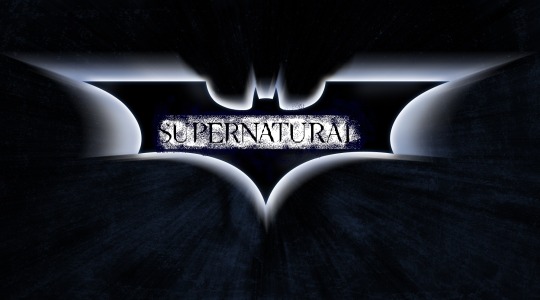
[FANFIC - Destiel & JayTim]
Multiverse Mishap | DCU Bat Family x Supernatural
Fandom: DCU Bat Family x Supernatrual Pairings: Destiel, Jay x Tim Rating: Teen Warnings: Swearing, Unhealthy Coping Mechanisms, Heavy Angst (with a happy ending), Implied Underage Prostitution Total Word Count: ~156k | SPN vers = 76k / Bat vers = 80k
Summary:
One slip up in the lab has Tim Drake careening into a new world where things are rather dramatically different from the world he’s used to. Fortunately, this is not his first rodeo. He knows how to handle this nonsense, more or less at least. Unfortunately, the people of the world he’s wound up in see things a little differently. And when Dick Grayson and Jason Todd mount an ill-conceived rescue mission, things get complicated very quickly.
When Team Free Will is at their lowest (well, their lowest as of YET, at least) with Castiel missing (and probably human), they get thrown a lifeline. Charlie calls with a lead on a strange young-man who bears a stunning resemblance to their MIA angel. Even with the world on a precipice around them, Sam and Dean won’t leave their angel out to dry—Dean especially has a few missteps he’d like to make up for… If only he could find some way to get through to one hella conked out Angel of the Lord.
This project started as a distraction and got WAY out of hand, but I’m actually really excited about it. I’ll be posting it as two separate stories on Ao3 (one form the Bat Family PoV and one from the SPN family PoV, both of which will be updating HERE...) with new chapters going up weekly, but only one chapter from each version.
As excited as I am about it, my schedule is currently in shambles because I got an opportunity to get the COVID Vaccine and it’s thrown my whole schedule into utter chaos. I’m hopeful that I’ll get back on track soon, but I can’t guarantee when I’ll be able to post here or on Ao3.
Since I can schedule posts on Patreon, that updating schedule will be much more definitively regular. The second chapters of each version are already available to Patrons and should open up to all viewers by Monday!
- Multiverse Mishap | SPN Vers - Chapter 2
- Multiverse Mishap | SPN Vers - Chapter 3
&
- Multiverse Mishap | Bat Vers - Chapter 2
Read the first chapter of the SPN version below (with Charlie playing a super spy and getting Sam & Dean a lead on a maybe-Castiel / maybe-alien-infiltrator) and I hope you all have a fabulous Easter Weekend (whether or not you celebrate religiously, you gotta admit the season-exclusive candy is pretty dang great!)! ^_~
A bit of fiddling, that’s all it was.
Well, that’s all it was supposed to be.
A device that plays with space-time and the very weave of whatever it was that spanned the gap between dimensions?
How could anyone just let something like that gather dust in an archive?
It functioned how it was meant to, it was only that what it was meant to do was cause harm… If they just tweaked it a bit, just a little, gave it an anchor point and limited the scale of possibilities… If they yanked down the juice that kept it powered to a more moderated level…
It could save lives.
So… fiddling.
Just a bit, here and there and on weekends when there wasn’t anything big going on.
The stupid thing wasn’t even turned on most of the time.
It was inert and dead as fricken paperweight (which honestly is what the fiddler in question had mostly been using it for)…
And then… it wasn’t.
One button, a loose screw, the slip of a paperclip…
A big flash of blinding light.
Silence, like the absolute nothing right before the tidal wave hits.
And in that silence, a tiny, over-caffeinated little voice:
“… Oops…”
_ _ _
Chapter 1 – MIA Angel or Alien Infiltrator?
Charlie Bradbury knows she’s awesome.
But there’s the standard awesome that any Queen of Moondoor is simply by nature of being epic enough to have achieved the throne to start with...
And then there’s the awesome that is having created a automated dark web trawling program to track the world’s Big Weirds (and only the very BIGGEST of the Big Weirds) and having that super secret extra level deep vault program actually work.
Well, of course it worked, but it like worked.
It found an Angel.
Sorta.
It found a something.
And an MIA angel, who was not exactly an angel anymore, but also couldn’t really pass as truly human, and who was still on like every watchlist ever (magical, criminal, meme-spirational, etc), but is somehow still entirely off the fricken radar?
Yeah. BIG Weird.
Said angel-not-angel popping up at a Biggerson’s in Ohio with no shoes, more money than god, an insane caffeine tolerance and absolutely no idea how to function inside a Walmart?
HELLA Big Weird.
So Charlie, being the awesome Queen that she is (and being acutely aware of what false hope here could do to the people in particular question with this) went to check it out herself.
Personally.
And, personally, she can say that this kid is the weirdest thing she’s ever seen, and after having day-tripped out to the literal Land of Oz a few times over… well, that’s sayin’ something.
Charlie’s met Castiel.
Not exactly her type, but she could see how that divine slice of puppy in a trench coat could be seen as something of a serious snack.
Though… If he weren’t an angel, she’d swear he was an alien.
But, like, a cool alien.
Much less spy-trained infiltrator than innocent human-admirer who wants to experience the local flavor on his little vacation out to the Milky Way’s most interesting backwater, Sol-3.
And the kid she finds in Ohio… is not that guy.
Not really.
For starters, she’s not entirely sure he’s old enough to drink alcohol.
And he’s… not looking for Sam and Dean ( which is seriously a BIG red flag for deciding whether this particular angel-not-angel is the right angel-not-angel).
He is looking for something, though.
Something he seems to think is in Kansas, near-ish enough to the Bunker’s coordinates to make her question the ‘not looking for Sam and Dean thing’ (but the absolute dinosaur of a smartphone he’s working on to pull up maps could totally just call the bunker, if he wanted to… or any of the plethora of emergency numbers the Boys have set up…).
Charlie’s looking on from a Very Inconspicuous post in the booth two tables away from the kid in the red hoodie and she can feel his frustration with the device radiating off him like physical Force pulses. Fortunately, proto-Sith this kid is not, and all the tables remain table-y.
She’s watching him fight with the internet to find something and his device’s crappy security means she didn’t even have to work hard to get her own screen to show what’s happening on his. He’s definitely looking at Kansas, at going to Kansas— Lebanon in particular.
Messy black hair, big blue eyes, grumpy face to rival any Netscape feline…
Looking for Lebanon and totally out of sync with humanity…
And… his oversized red hoodie just happens to have the 2-D rendering of a big black pair of wings stitched into its backside— stemming right from where they should on the kid’s shoulder blades if the wings were real.
Charlie’s not really gullible enough to believe in signs from God anymore…
But if she were… well, that would be pretty convincingly Divine Sign-like.
So, she makes the call.
Sam picks up on the third ring.
“So, you know how like the main character always has dramatically weird colored hair and sits in the second to last desk by the window?”
With a heavy sigh filled with enough affection to make Charlie’s insides feel all squiggly and warm, Sam says, “No, Charlie, I have absolutely no idea.”
“Well, they do.”
“Okay. And?”
“They are Narrative Significant, they stick out from the background in like a big way, but not just in like a ‘doing main character things’ kinda way,” Charlie rambles, trying to find her point buried under the spiraling metaphor.
“Charlie, do you know what time it is?”
“Uh, 2, maybe, 3am. I think. But that may have been like three coffees ago,” Charlie prattles off automatically before veering back on track, “Anyway. The point is that I think I found a main character. He’s not the character I thought he should be, though. He doesn’t look right. He’s too young. And no trench coat. But he is hella out of sync… and the blue eyes and black hair and everything else…”
There’s a pause as Sam’s non-caffeinated brain tries to keep up with Charlie’s infodump.
“Trench coat?”
“I think I found him, Sam,” Charlie whispers. “I think I found Castiel. Well, I found someone weird enough to maybe be Castiel, in the Castiel kind of way, and he’s looking for a way to get to Lebanon, so…”
Much more alert, Sam asks, “Where are you?”
“Ohio. Quaint little place called Granville,” Charlie reports. “It’s a pretty straight shot to the Bunker, but it’s like 14 hours on the road and I’m not sure the gods of caffeine consumption will really be cool with me pushing their bounty that hard…”
“Don’t try too hard to get him to go anywhere with you, see if you can just offer to pay for a motel room for the night,” Sam instructs, the sounds of a pack being prepped with one hand clanging about in the background. “We’ll be in Granville before noon.”
“What if he really wants to head out?”
“Take it slow and text us when you get gas, we’ll meet you in Indianapolis.”
He’s using ‘Serious Sam’ voice.
It’s the voice that makes panicking bunny rabbits being chased by wendigos settle down for half a second so Dean can frickin torch those ghost-y cannibal creepers.
Only, in this case, the wendigos aren’t cannibal forest ghosts chomping down on campers. This time, the Big Bad that Dean is unequivocally about to destroy is approximately 909 miles of US Highway 36.
It makes Charlie feel a little bit better about nearly everything that’s wrong.
She hangs up with Sam after promising to keep the updates coming, and looks back at the kid who could be Castiel.
Only to find him looking back.
For a minute, she’s worried that he heard her talking to Sam about him.
But he seems kinda zonked.
And he doesn’t look upset or embarrassed or angry, so…
She is the only other person on this side of the Biggerson’s, (and really she’s the only non-staff member in this Biggerson’s all told besides the kid himself), so it’s really not that strange for her to be the dust mote in motion that’s wound up drawing the kid’s eye.
He’s not really expressing anything.
He’s just looking.
It’s weird.
Whelp, he’s got that creepy unblinking stare down pat, bird-like head-tip and all.
The kind of stare that’s not angry or judgmental but feels more clinical than anything else, like he’s seeing through the bones and skin and sinew to the soul that’s underneath.
Dissecting it and diagnosing it…
It makes her shiver.
But she plasters on a smile and says, “Hey. You wanna refill?”
The kid looks down at his empty coffee cup.
He blinks, real slow like.
Then he nods.
Relief floods Charlie.
Step One, making with the contact with the Target. Check.
In her experience that’s usually been the hardest part of these things.
Not that she really has much experience in ‘these things’…
But still, Score 1 for the Queen, yeah?
She signals to a waitress for two more cups of coffee, shots of espresso boosting both of them. It’s like a weird AU of a sleezy bar beat, a remixed mark meets con-woman kinda thing.
“So, kid, what’s your name?”
“Shouldn’t you tell me yours first?”
Charlie shrugs. “Well, generally yeah, that is the convention. But I like being unconventional, I guess.”
Really, it’s that she hasn’t quite decided what name to give him.
He blinks expectantly, head tipping over again.
Realizing that she’s already giving up ground in this pseudo-battle of wills and whatnot, Charlie sighs heavily and says, “I’m Charlie, Charlie Bradbury. Geek extraordinaire.”
The kid nods, visibly internalizing the information.
Trying really hard not to be perturbed by that, Charlie barrels on to say, “I see that tablet of yours is gone a bit wonky. You looking for something in Kansas? I might be able to fix your tech or find what you’re looking for with mine.”
“My tablet…” With big owl eyes, the kid glances down at the piece of crap barely smart enough to call a screen and gives a plaintive little huff. “It is… insufficient.”
Charlie gives a laugh that only sounds two-thirds forced and says, “Understatement, buddy. You’re grand at it.”
The kid simply frowns.
“So,” she says, drum-rolling her fingers on the plastic tabletop as she leans into the leading questions. “Tell me what’s your name and what you’re looking for in Kansas and we’ll see if I can work my magic, huh?”
The kid’s eyes narrow suspiciously on the word ‘magic’, but he gives no other reaction.
For a solid minute, easy, they just kinda sit there.
And then the kid downs a full cup of espresso-boosted coffee like it’s a bottle of watered down Gatorade and flashes Charlie the stiffest stretch of smile she’s ever seen on any face that still looks mostly-human.
�� “My name’s Alvin,” he tells her with all the bland panache of a used car salesman. “Alvin Draper. And honestly? I’m looking for a hole in the universe.”
Charlie almost bursts out laughing.
The kid— Alvin— spots the reaction. He glowers, quite impressively, to be honest.
“Well, Alvin, that’s the fakest fake-name I’ve ever heard, but I think I can help with the ‘hole in the universe’ thing,” she tells him.
Alvin’s frowning again, it’s adorable and endearing in ways it really shouldn’t be.
“One problem, though,” she lays out. “You’re gonna have to be a little more specific about which hole in the universe or tear in the fabric of reality your talking about.”
Taken entirely aback, Alvin huffs, “Is it a commonplace occurrence to have your universe ripped open, then?”
“Well, not exactly. It’s more like our universe is the knit-scarf version of a life-raft,” Charlie explains, wheezing a bit as the metaphor sinks perfectly into a crack she didn’t quite realize she still needed to find a way to fill. “Things here aren’t… Well, uh, how many apocalypses have you fended off this week?”
“You’re really just gonna roll with the implicit declaration that I’m from another universe and you’re not going to question my sanity?”
Alvin looks like he’s suddenly questioning her sanity.
For a beat, Charlie feels insulted.
But really, his reaction is the more logical one.
Maybe Charlie should start trying to talk to more normies here soon, she’s totally lost touch with what constitutes a ‘reasonable reaction to weird shit’.
“Whelp, I’m not a Time Lord or anything,” she confesses, “but I’ve had enough contact with the Supernatural to know how to spot someone who’s brushed up against something ugly in the dark and is kinda freaking out about it. You fit the bill, Alvin.”
The kid rolls his eyes.
It could be an angel-learned-it-from-Dean thing, it really could be.
The weight of the sarcasm is just that strong.
“Fine, yes. ‘Alvin’ is not my real name,” he admits.
Then he casts a wicked smile her way that almost makes her rethink the ‘learned it from Dean’ idea, because this is… creepy in an almost Demon kinda way… in an almost Leviathan way. The grin is so unnerving that Charlie almost misses his next words:
“But you know, I’m pretty damn sure that ‘Charlie’ isn’t yours.”
“Yeah? Well, darn. Ya got me,” she breathes, trying to make herself remember that the Leviathan are gone, that she didn’t even see Cas when he was one of them.
In any other circumstance, Charlie would be reaching for the Borax.
But this angel-not-angel (and maybe-but-probably-not-demon-or-leviathan) kid whose name is definitely not Alvin, notices her sudden stiffness.
Immediately, he softens.
“Hey, what happened? You okay?”
Charlie shrugs. “You wouldn’t happen to be allergic to a certain 19th century boron-containing sodium compound, would ya?”
“Sodium borate? Like Borax? Can’t say I am,” the kid assures. “Any particular reason?”
“Uh, the word ‘Leviathan’ mean anything to you? Like specific, human-livestock-eating, double-tongued with lots of teeth lizard-men people-imitators specific? ‘Cause you just really reminded me of one there. And like I had a friend go Darkside… well, a lotta my friends have actually gone Darkside, but there was one and he… he’s missing still and well, bad things happen to my friends when they go missing.”
“Like apocalypses?”
“Yeah, kinda.”
“Really? Literal apocalypses? How exactly literal?”
“Um, pick a holy book at random? We’ve probably hit most of them by now,” Charlie admits, with a discomfited shrug as she vaguely wonders how she ended up on this side of the metaphorical interrogation table. “I think the first one was the Judeo-Christian one, they took things pretty literal. Michael-Lucifer prize fight and all…”
“Okay…” the kid says, finally sounding a little thrown, “but you stopped that one?”
“Yeah,” she tells him.
“So where are you now?”
“Somewhere between God’s little sister throwing a world-ending temper tantrum and you know a Luci-spawn antichrist accidentally poof-ing up new laws of physics?”
“Sounds plausible,” the kid tells her, his tone both entirely accepting of it as the gospel truth and sounding like he thinks she’s totally bonkers.
“No, it really doesn’t,” Charlie sighs. “Doesn’t change the fact it’s true. But enough about me and my world-ending escapades. How about your hole in the universe?”
“That’s the thing… See, I don’t remember.”
“What?”
“I don’t remember how I got here, I just remember that I don’t belong,” the kid confesses, sounding a lot more like he’s being honest than before. “I’m not supposed to be here, but I can’t explain what might be able to bring me back.”
“So, Lebanon, Kansas?”
“Has a safehouse I remember, or I think I do,” he lays out. “And it has a power source I think I need. And…”
“And..?”
Charlie’s hoping for something about the people waiting for him there, something about the ‘profound bond’ doing something to clue him in.
She can’t tell if this is just a spell or something, or if it’s a consequence of having Fallen, regained Angel status, and then seemingly kicked it again in the fastest repeat of the cycle yet.
“I dunno,” he sighs. “I just have to be there.”
Well, it’s not what she was hoping for.
But it’s still closer than she thought she’d get…
So, she’s still not 100% certain this kid is a whammied Castiel.
But she’s definitely like 85% certain, maybe 87%.
And in Winchester World? That there’s some pretty damn good lookin’ odds. So, Charlie will take what she can get and will roll with the rest.
Sam and Dean will be here in a few more hours. All she has to do ‘till then is keep this kid in arm’s reach and keep them both from being buckled up for the looney bin.
Sounds totally doable, right?
In retrospect, Charlie may have to adjust her definition of ‘doable’…
_ _ _
Keep up with everything I’m getting up to HERE!
Have a great week!
#fanfiction#fanfic#batman#batman & robin#BatFam#DCU#dcu fanfic#SPN#spn fanfic#supernatural#destiel#jay x tim#jason todd x tim drake#dean x castiel#multiverse#crossover#charlie bradbury
5 notes
·
View notes
Note
Hello! I saw M.A. is going to be played again in February! 🤩 Apparently there's going to be a new cast. What do you think about it? Do you think Furukawa won't play in it anymore? Are you goin to see it anyways?
【Related post: TOHO’s MA 2018 Introduction】

Dear Anon,
I am glad you asked, thank you! Just this morning I had a passionate conversation about this announcement with a friend!
Yes indeed, the cast will be quite different! The two MAs remain the same, but most notably, Fersen and Duke of Orleans are changed. Tashiro Mario reprises his role as Fersen, but the double cast will be fulfilled by Kai Shouma (甲斐翔真), a fresh new adult of merely 22 years old with an even fresher filmography. The antagonist will be played by Uehara Rio (上原理生) and Onoda Ryunosuke (小野田龍之介), both more experienced actors with a solid stage history.
My opinion about the 2021 cast
The M.A.s
I am glad that Sonim (Margrid) and Sasamoto (Marie Antoinette) get to stay, because they were the axis of the musical. They are what was required to deliver the important nuance to the show. Without their level of deep character studies, the show would have become a simple ‘monarchy vs republic’ story, instead of a story of people. The greatest thing about the A-cast version of 2018 MA is that it never tries to ‘educate’ its audience; it simply wanted to tell a good story of people.
I have seen versions with such unsympathetic Antoinettes that just made me go: “yeah the revolutionaries should just get on with it”. Reversely, I have also seen such whimpering Antoinettes that they make me doubt she is the woman who wrote: “all the hatred of France has accumulated on me, may it also disappear along with me.” (Nakano 2012)
Margrid is also a somewhat tricky role; one misstep and this woman with her own principles, emotions and agenda will get reduced to ‘that mislead girl corrupted by external evil’. Without Sonim, it would easily have been a woman who was lead astray because she needed a worthy leader, but was then tragically deceived!!! Reversely, if the nuance had not been done so well by her, it would have been difficult to acknowledge the redemption attempt for such a viscous person in the end.
Of course Hanafusa and Kon also reprise their roles. I have only seen their performance once, but I have to say that neither left much of an impression on me the same way Sasamoto and Sonim did even during my first viewing. Perhaps Hanafusa and Kon will dramatically revamp their performances, perhaps they will not. Who knows. I have much hope for Kon especially; second time, second chance.
Kai Shouma - Fersen
I have not seen anything of Kai Shouma except glimpses of his Yagami Light, so it is very hard for me to judge him. From what I have seen, his voice is pretttty good. Not amazing, but pretty good nevertheless. His acting for Light was pretty solid though! I have not read any interviews from him, so I can’t tell how good Kai is at deep diving for characters. Fersen’s script is rather difficult to work with in my opinion, and so far except for Furukawa’s portrayal, I have not seen any rendition of Axel von Fersen that is more than just a tragic lover.
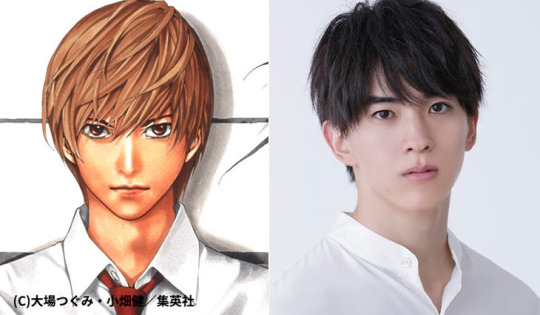
Kai does have star power! But what type of star power he has will be what he’ll ultimately be tested for. The thing I noticed about Tashiro’s Fersen is that his tremendous star power ironically became his biggest impediment. He constantly threatened to steal all the spotlights, and even when literally in the background his dramatic body language just screamed “WITNESS MY BISHIE SPARKLES!” Co-acting with Hanafusa demanding style, he was not so much playing ‘with’ her as much as playing ‘against’ her.
Fersen’s role in MA is supposed to be in the background, and the ultimate test is whether he can stay in the background without disappearing, as well as catching enough attention without outshining the two leads. I’m not sure whether it was so much Furukawa who managed that task perfectly, or he who taught everyone that that is the only way this role can work. The star power I saw from Kai in Death Note was befitting of this memorable lead, and I hope this power is something this young man can command at free will.
The Duke d’Orleans
Uehara Rio
Uehara is one of the most powerful singers I have ever had the pleasure of seeing, and his style is energetic, bombastic and explosive. He would surely be a worthy lead antagonist in terms of star power.
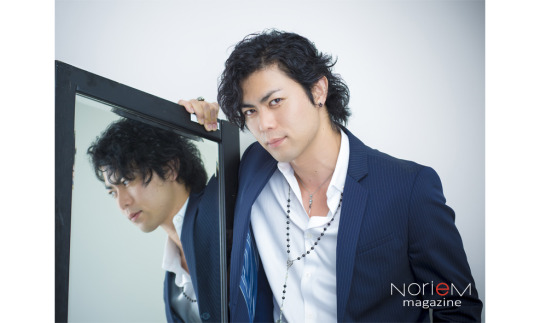
The previous d’Orleans Yoshihara Mitsuo is phenomenal, and I would be lying if I said I have no concerns whether anybody can ever fill his shoes. As explained in the post linked above, Yoshileans has managed to portray a villain who is the protagonist of his own story. D’Orleans’ script itself however, is quite limiting in the sense that it leaves very little wriggle room outside the ‘greedy throne usurper’ narrative. Yoshihara however, SOMEHOW managed to pull of what he did, anyway.
My impression of Uehara Rio is that he tends to take the most obvious trait of any character, and tune that up to 11. He has a natural flair that just sucks you into his memorable performance, but his flair does often threaten to swallow the character itself whole. In a spectacle-based production like ‘1789 - les amants de la bastille’ it is like icing on a cake. But in a nuance based production like MA, I fear he might become the icing on a broccoli quiche and end up being ‘the villain because the script says so’.
BUT! I have not seen anything of his d’Orleans yet, so I will give him a fair chance!
Onoda Ryunosuke
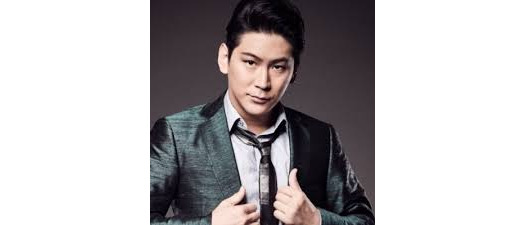
I have seen NOTHING of Onoda yet, so I can’t judge whatsoever. But I know he is a veteran musical actor with a huge stage history. I am curious to see what he’ll make of this role too, but here too I admit again that I do have concerns about the giant shoes Yoshihara left behind.
[Why] I think Furukawa won’t reprise the role as Fersen
Dear Anon, you said “Do you think Furukawa won't play in it anymore?”, do you perhaps mean ‘why’ I think so? If you just meant it exactly as you typed, well, it’s confirmed that he won’t reprise the role, so... yeah ^_^;;
If you are a normal human being and therefore made a typo, then my answer is:
I THINK Furukawa is just too busy, and perhaps the schedule would clash with ‘Elisabeth 2020′s reopening? Perhaps? Potentially, maybe? Hypothetically? I don’t know.
Otherwise, it COULD be that Furukawa saw Yoshihara leave, and went: NAH. These two did build up an amazing friendship and chemistry, both having spent HOURS together discussing their roles. (This is just my own wild fantasy though, please don’t take me too seriously).
Am I going to the musical?
Right now I don’t think I am going to this musical for several personal reasons; but who knows how things will turn out in the end. I do have to say, I already have the DVD with my dream cast, and I feel like MA-wise, I have no thirsts that need quenching anymore.
#Marie Antoinette#MA#Musical#2021#TOHO#Sasamoto Rena#Hanafusa Mari#Sonim#Kon Natsumi#Tashiro Mario#Fersen#Hans axel von fersen#Uehara Rio#Onoda Ryunosuke#Kai Shouma
14 notes
·
View notes
Text
Top 5 Things I Liked About RWBY Volume 7
(Top Dislikes)
Gosh, we are so close to Volume 8 now, and it’s driving me crazy! But we’re not there yet. So let’s continue to remember what Volume 7 delivered upon us. Last time I did the Dislikes post, so now it’s time for the Top 5 Likes post! Which this was so, SO much easier to come up with than the Dislikes list! Like I said there, this volume is so well-written and jam-packed full-on content. It was a rollercoaster of a ride where even though I didn’t want to get back on for a while, that thrill was everlasting. Whether V8 will give the same result will be determined soon, but for now let’s go over the Top 5 Likes of RWBY Volume 7. As always, just my opinion, so take with a grain of salt~
Okay, let’s go!
#5. Oscar Development
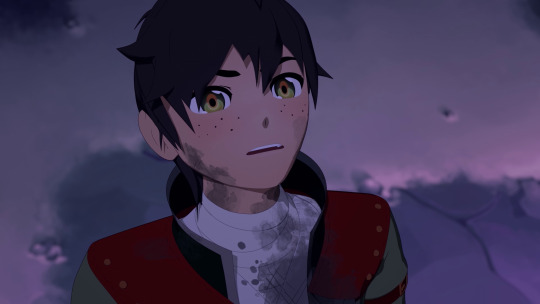
By far one of the biggest criticisms against Volume 6 was how it handled Oscar. There was a LOT of good setup concerning his identity crisis as he struggled with keeping control, maintaining his own identity, and the potential burden of just being another of Oz’s wasted lives. While he DID reach a new confidence by the end which was nice, it... was more or less offscreen. To many, myself included, Oscar felt wasted and I specifically criticized how the execution made it feel like depite what Ruby said and what the narrative is trying to say, it DOES feel like Oscar’s viewed as just Oz’s vessel and that’s all his importance amounted to. I was hoping that Volume 7 was going to rectify this like they did with Ruby in Volume 6. Did they do so?
Absolutely yes.
While they still have a bad habit of setting up Oscar in trouble but it turning out to be a fake-out (his disappearance due to Neo), the volume did a LOT to improve his position. With Oz gone, Oscar has to be diplomatic on his own. He’s in a position where he can get close to Ironwood in a way that the others can’t and see him actually vulnerable. Unlike the others, who keep just pointing out to Ironwood how his actions are problematic to varying degrees, Oscar can see what’s really causing it: fear. Which is something that Oscar can relate to. After all, he was terrified when his quest began, but he always faced it and went forward everything to do what was right. Even when it meant leaving home, even when it meant facing unjust anger from others, he did so.
Oscar tries to reason with Ironwood. He tries to have him realize that it’s okay to be afraid. That it’s okay to be honest with those around him. That it’s okay to be vulnerable. Ironwood isn’t the only one either. In the beginning, he’s worried about Ruby’s lie because of how much it reminds him of what Oz did to them. You could argue that he’s developed into the conscious of the group, but he knows how to reason with these matters in a peaceful way. He’s becoming more of a diplomat similar to Ozpin, which even Ironwood points out in Chapter 9.
Then there’s the finale. Sadly, despite all of his pleas and how much he reached out to him, Ironwood ultimately rejected him and Oz. He rejected the route of trust and embraced fear, sealing the deal by shooting Oscar. But while he couldn’t help Ironwood, he did help someone else: Ozpin. His words convinced the former headmaster to at last return and face his own fears, saving them both. It also allowed Oscar to gain more of Oz’s power and memories. The boy has gone form a scared teenager entering a world he doesn’t truly understand, to becoming a courageous young man filled with compassion and hope for those around him. And this time, we got to actually see that growth unfold. He’s still got a long path ahead of him, but this greatly amended Oscar’s character and I am grateful for it.
#4. Penny Polendina
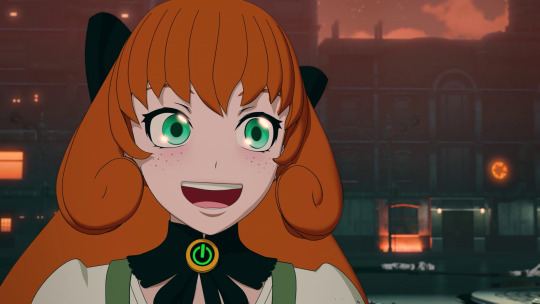
SHE CAME BACK! YAY!!! I MISSED HER SO MUCH!!!
Every since hr death in V3, I fully expected Penny to come back at some point. And indeed, she did! And with her memory intact, thank goodness! While I do wish we got some more exploration in how she felt about dying and such, her role int his volume was so well done I can forgive it. She has more screentime in this volume than Volumes 1-3 combined, and I love it! A cute new design, her struggling between duty and her own wants, trying to understand feelings and finding them to be a beautiful thing, there is SO MUCH going on with her here.
Penny is part of Ironwood’s inner circle, having been assigned as he Protector of Mantle. She takes her job seriously and does her best to protect the citizens. She’s elated to see Ruby and the others again and tries to assist them as much as she can. But as the volume goes, we see how much she struggles between her dedication to Mantle and Ironwood’s orders. It’s especially clear fter she is framed for the massacre during the elections. The poor girl is mortified, everyone viewing her as just another of Ironwood’s robots. Even Ironwood feels this way with his insensitive comment bout her being ‘under his control’ during the Council Meeting. The poor girl just needs a hug.
But this helps set Penny apart from Atlas. Unlike the others, who are following orders, Penny is trying to follow her heart. She tries to encourage Winter to do the same when she snapped at Jaques, even saying that all she did was speak form the heart and has no reason to feel ashamed of it. After Ironwood declares martial law, she is clearly upset and outright says that it’s wrong. She even asks Winter if this bothers her, and isn’t very convinced by her argument about the general taking on the burden. Penny chooses to embrace her feelings, not reject them as Winter, the Ace-Ops, and Ironwood have done.
It ends with Penny comforting Fria as her Maiden powers go out of control. How does she do this? She simply goes up to her and gently asks her if she’s okay. She shows the old woman more compassion and care than she’s probably had in quite a while. As a result, Fria ultimately transfers the Winter Maiden powers ot her. It proves beyond a shadow of a doubt that despite being a robot, Penny is a real girl. Hell, she is by far the most human of the Atlesian characters in this volume. She ultimately feels disheartened by Fria’s death, but still goes with Ruby and the others because that’s the right thing.
Penny’s character arc was a delight. There were so many expectations with her return, and I am so happy with the result! Penny feels so much more three-dimensional now. She still has the sweetness that made us love her before, but she also grew as a character. She embraced her feelings, she made choices for herself after having to abide by Ironwood’s rules for so long, she even managed to get some payback on Cinder for her death. Her good-heart and kindness was rewarded at the end. I do worry for her, especially since Salem’s Whale Grimm is absolutely a Montstro reference, but I’m still so happy with her in this volume~
3. The Atlas/Mantle Conflict

I am... not good at talking about this kind of thing, so I apologize if this seems rambly or all over the place. The big conflict pf the volume was the division between Atlas and Mantle. We knew going in how Atlas was seen as a bastion of civilization, but also full of snobs and an army leader who doesn’t exactly have his priorities straight. We knew that Mantle was the former capital and it was easy to assume that it probably wasn’t in the best state... and HO BOY were we right.
While Atlas looks futuristic and pristine, Mantle is run-down and out-of-date. The former capital and it’s people have not been treated well and worse, Atlas controls everything including their heating system. Ironwood has forced the city to be without essential provisions for Amity, and has therefore left them vulnerable to the Grimm. It’s easy to see why Mantle would resent Ironwood and Atlas as a whole, and why it was easy for Watts and Tyrian to widen the divide. It’s like the Chorus conflict in the Chorus Trilogy in RvB, only we’re there to see the division outright instead of coming in many years later. Our heroes are trying to mend the divide, but it’s so much easier said than done when neither side will budge.
There’s a lot of contrast with the two sides. Ironwood is a seemingly cold man with an authoritarian streak. Robyn is more laid-back, if a little cocky but her heart is very much set on helping Mantle. Both can be very brash and place trust above all else. But they both run their respective groups very differently. Robyn views the Happy Huntresses as her friends, while Ironwood trained the Ace-Ops to be his loyal attack dogs. Robyn is willing to give her trust until it gets broken, while Ironwood is wrapped by his own paranoia. We see how these two groups function. They have similarities, but are also very different especially when it comes to how their leaders treat their respective groups.
There is a HUGE class issue between Atlas and Mantle. It’s not helped by Ironwood’s plans causing further suffering, and of course in the end he chooses to leave it open to Salem in favor of saving Atlas. The fandom has fought back and forth for months over if this was right or not, which only proves the point of the division. You can see where each side is coming from, and we care for the people on each side. The conflict was presented throughout the volume with the heroes trying to help, but they sadly fail. The moment Tyrian’s slaughter happens in Chapter 6, you can break the tension with a butter knife and it doesn’t let up. We’ll probably only see more of it with Volume 8 now that Mantle has no protection. But as far as this volume goes, it was presented very well and very strongly.
#2. The Fall of James Ironwood
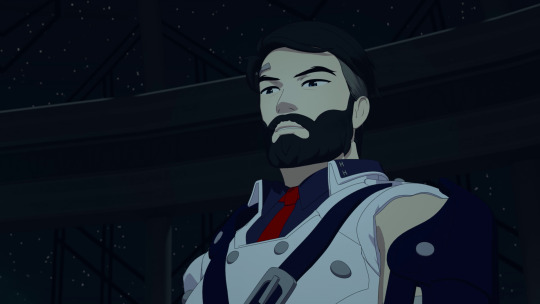
Love him or hate him, Ironwood is by far one of the strongest written characters in the show. Ever since his intro in Volume 2, we have been building up to this moment. The man has a LO of flaws. He’s arrogant, brash, favors military might over being discreet, and has a bad tendency to not learn form his missteps. These flaws contributed to the Fall of Beacon. But we also saw a man who was honest, righteous, respected Ozpin, and for all had flaws seemed to have good intentions. He was always willing to put himself on the front lines and took none of Jaques’ elitist shit. Sure he caused the Dust Embargo and closed Atlas down, but he also defended Weiss in Volume 4 and was clearly upset about the Fall fo Beacon. We saw a flawed, but still good man and if he could just embrace his flaws and open his heart, he could have been the great hero that he appeared to be.
Sadly thought, that wasn’t meant to be.
Ironwood is shown to be dishelved and plagued by paranoia, but he HAS created a plan to re-establish communications and expose Salem. But his police state with Mantle has the heroes concerned, so they lie to him about Oz and the lamp. The man continues to make questionable decisions, like I already said about his treatment of Mantle. But he still seems devoted tot he cause and like despite these calls, his intentions are still good and it will pay off even with the bad press. Heck, after Robyn tells him to trust her in Chapter 9 and with a push form Oscar, he seemed to FINALLY be doing the right thing. he revealed the truth about Salem to everyone, he worked alongside Mantle, and he faced Watts in the same place where his greatest failure had occurred. It seemed like all the begging and pleading had worked.
Sadly though, it all fell apart once Ironwood saw the glass chess piece.
Ironwood’s greatest enemy isn’t Salem. It’s not Robyn. It’s not he council. No, it’s himself. He has closed up his emotions and his hear to everyone around him. He has buried himself in his paranoia and his pursuit in defeating Salem. With every mistake, Ironwood failed to learn and move forward. He just became more and more consumed by his own fear. He wanted to be a strong leader. To be like Oz. But like Oz, he ended up losing himself and unlike Oz, he couldn’t acknowledge where he went wrong. In many ways you can sympathize with him because of the bleak situation and him trying to do what he can with what he has. But sadly, none of that can justify the path that he ended up taking.
Ironwood is angry at Team RWBYs lies. This and Salem’s approach pretty much causes him to snap. He’s going to let Fria die so that Winter had the Maiden powers. He's going to abandon Mantle to their demise in a futile plan to raise Atlas into orbit. When RWBY opposes this, he orders them to be arrested. He even coldly confirms that he’s leaving Mantle to die. However one feels about this choice, as a cruel but necessary choice to save what can be saved, or a needless sacrifice made by a fascist dictator, one can at least make an argument about either point that makes it hard to say who was right. Him snapping at Oscar and knowingly shooting the kid to his demise? No. That one cannot be justified at all, especially since he was as cold as steel when he did it.
This moment has been built-up since we met him all those years ago. We wanted Ironwood to do the right thing. We all hoped that he would. But he didn’t, and it isn’t shocking at all. We saw enough to like Ironwood, but to also be very much aware of his faults that he just never seemed able to conquer. His fall form grace is tragic, yet done in such a satisfying way as well. I felt for him, but there was no justifying his actions. I kept hoping that he’d pull through, but once Chapter 11 hit, I knew we were at the point of no return. The James Ironwood we once knew is no more, consumed by his fear. What will happen to him next? Will he manage to realize his wrongs? Or will he continue to fall until there’s nothing left to salvage? It’s hard to say. But for now, the tin man has lost his heart,. A very sad, but very well done, character arc for sure.
1. The Theme of Trust and Fear
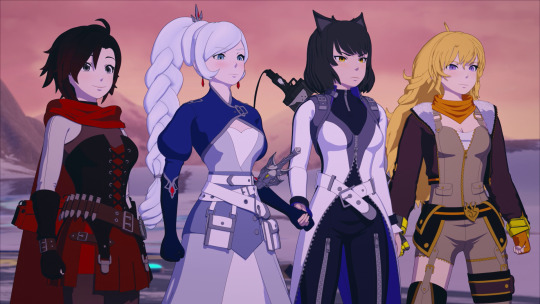
When I first heart this volume’s opening, Trust Love, I liked it... but the more the volume went, the more the optimistic song felt out of place for the dark volume. Considering this IS an anime, that’s probably intentional. But the more I examined the lyrics, especially after the full version came out, the more I truly realized how it fits with this volume. The song speaks of one trying to live in their dream world, but they need to face reality and trust those around them. They need to stop waiting for a miracle, they need to take control of their life now and move forward. hey need to... well, trust in love. Then you have the finale song, Fear, which outright asks ‘who will you be when you are faced with fear? Will you see the person you hope to see? Or will you see a stranger?” Will you feel proud? Or will you feel betrayed?
This is the theme of the volume. The theme of trust and the right thing against fear. Ironwood claims to trust the heroes, yet he can’t trust anyone else and his own fear is slowly consuming him. The heroes are mistrustful of Ironwood, but they trust each other and want to help mend the divide between Ironwood and Mantle. But at every turn, fear gets ii n he way. Tyrian’s slaughter makes Mantle afraid and enraged. Ironwood’s fear keeps him from opening up and it leads to his downfall as I already described. The Ace-Ops don’t fight together as a team, which leads to Team RWBY who DO trust each other to defeat them. Clover is blinded by his loyalty to Ironwood to recognize that he’s doing the wrong thing, and it leads to his death. Not to mention the mistrust between him, Qrow, and Robyn lead tot he crash to begin with.
As Oz says in his monologue, fear is the greatest thing that everyone shares. We see everyone afraid. Ironwood is afraid. Ruby is afraid. Ozpin is afraid. Even Cinder is afraid. It’s all for different reasons. Ironwood is afraid of Salem. Ruby is afraid of the uncertainty ahead. Ren is afraid of failing Nora and the others. Cinder is afraid of failing to achieve her foals. Qrow is afraid of bonding with others, especially considering what happened to Clover. Ozpin...d o I even need to elaborate on him? The title to Chapter 13 is ‘The Enemy of Trust’. What is that enemy? Fear. Recently, I’ve been feeling that same fear of trust. Fear of being hurt. Fear of being betrayed. Fear of the unknown. It’s a VERY powerful force, and a tempting one at that.
The message of the volume ultimately si that it’s okay to be afraid. It’s perfectly human to feel that way. You don’t need to get over it. It doesn’t matter if you’re afraid, it’s what you do in the face of it that matters. Will you face it? Will you do what’s right? Will you find it in yourself to trust and love again? Or will you succumb to it? Will you end up repeating your mistakes because of your fear? Will you make the wrong choice? What will that say about the person you are? One way or another, we all will find out the answer to that question. We may not know the answers for a long time, but you ultimately need to try and do what’s right. You can’t let the fear control you. You need to decide who you will be when ti comes, and if in the end you will be happy with who you are left with.
Ironwood chose to repeat his mistakes, and is now a heartless tin soldier. Ozpin ultimately chose to return and face it and while only time will determine how that goes, it’s a step in the right direction. People like Ruby and Oscar still tried to do what thy knew was right. Weiss was afraid of her father, but faced him to gain her freedom. Blake feared Adam and the White Fang and chose to run, but eventually decided to fight back and ultimately won. Yang was afraid after losing her arm and of being abandoned, and while she struggled she ultimately faced it, proving herself stronger than her cowardly mother. Even after Ruby broke down when it became clear that Salem killed her mother, she still faced the wicked witch, told her off to her face, and pulled herself together enough to warn everyone about Ironwood and stand her ground. And there’s so any other examples that I could list.
I think considering the times right now, this message is incredibly important. It’s been a major part of the series since the start, but Volume 7 especially made it prominent. We need to trust in love. We need to be courageous enough to do the right thing. We need to be able to express our fear and doubts with others to become better. In a world where everything 9si uncertain and everyone is on edge, I think that the themes here are more relevant than ever, and was handled very well. Especially with that monologue in Chapter 13. As such, this is my favorite part of RWBY Volume 7 without a doubt.
Well, that’s it folks! It was nice to revisit Volume 7 again after so long~ But as we close the book, we’re about to open another for Volume Eight. What’s gonna happen? I don’t know. Am I scared? Oh big time. But I’ve come this far, I’m not backing out until the very end. So I hope that you all enjoy Volume 8, and as always I look forward to reviewing it all~ See you all on premiere day~!
6 notes
·
View notes
Text
Blood and Chocolate: An Adaptation in Name Only
Previously: Section 0 – Introduction, Section 1 – The Book, Section 2 – Adaptation Challenges
Section 3 – The Adaptation
Preface: The 2007 adaptation of Blood and Chocolate directed by Katja von Garnier and written by Ehren Kruger and Christopher Landon did not receive critical acclaim. It stands at 11% on Rotten Tomatoes, and a New York Times review by Jeannette Catsoulis called it “uninvolving and cliché-ridden”. The box office returns were similarly underwhelming, grossing $3.5 million domestically and $6.3 million internationally against a $15 million budget – an $8.7 million loss for a production company used to receiving at least a modest return on investment for other, similar properties.
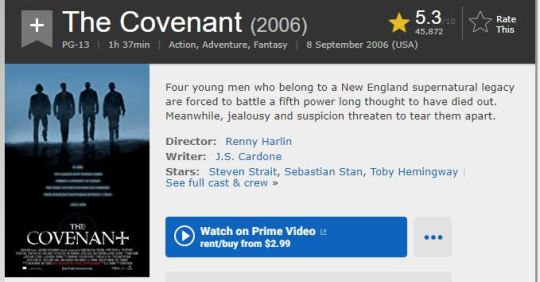
(Ahem.)
But, does it have any merit? It may have failed by the metrics of profitability and critical response, but that does not mean that the film was an entirely, or even partially, failed endeavor.
Summary: Following a surprisingly faithful Romeo and Juliet plot, the movie Blood and Chocolate centers on Vivian, the werewolf Juliet, an orphan living in Bucharest with her Aunt Astrid, who serves as a rough Nurse analogue. They are ruled by Gabriel, the Paris, a tyrannical pack leader with romantic designs on Vivian. The human Romeo, Aiden, is a wandering American artist who encounters Vivian anonymously in an empty church, whereupon he becomes determined to find and court her. Meanwhile, tensions are rising with the Tybalt character, Vivian’s cousin Rafe. He discovers Vivian and Aiden’s romance, threatens Aiden, and is eventually killed by Aiden in self-defense.
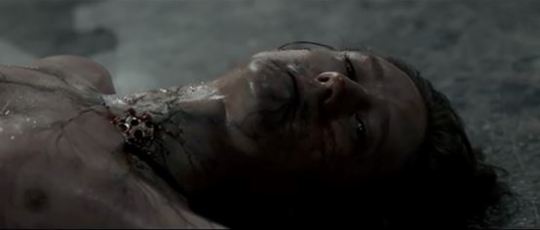
Eventually, Vivian gets poisoned and she and Aiden attempt to escape the city. She is captured and locked up in Gabriel’s headquarters, where Aiden arrives and rescues her. In the process, Vivian kills Gabriel. Afterward, they escape, steal Gabriel’s car, and drive off into the sunset.
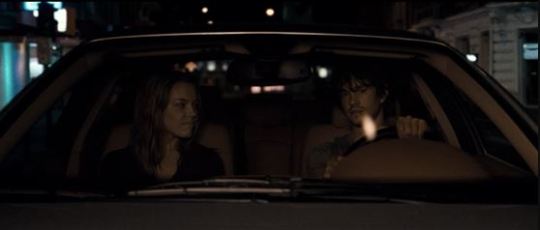
Also, there’s a prophecy about Vivian? More on that later.
Themes: The themes of the movie deviate sharply from the themes of the book. No longer does Vivian struggle with what she wants as opposed to what she needs, because the movie removes any such opposition. In the movie, as in the book, Vivian wants to be with Aiden, but the movie rearranges the rest of the plot and the characters so that what she no longer needs to accept (and find a partner who also accepts) her dual nature as a werewolf to find happiness and fulfillment. Instead, what the film version of Vivian needs is to get away from her creepy, possessive pack leader and forge her own destiny. This “need” no longer stands in opposition to her “want”. On the contrary, the two share a resolution – run away from Bucharest with Aiden. The tension between the human and the animal sides of Vivian’s nature is also reworked. In the book, she can’t pretend to be human, but she also can’t lose control and give in to her animal side. She needs to balance both. The movie, on the other hand, has Vivian definitively choose her human side by choosing Aiden. Actually, no, it’s not just that she chooses her human side – the movie shows her actively rejecting her werewolf side throughout the movie. And, well, given the way that werewolf society is treating her, I can’t really blame her. I wouldn’t fight to stay with these people either. They were ready to pair her off with a man old enough to be her father without her consent.
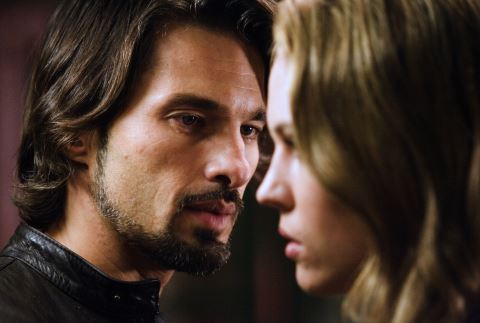
Honestly, I wasn’t really wondering why she wanted to leave with Aiden, but more wondering why she hadn’t left already.
This leads into the theme that was added for the movie: destiny vs. choice. As a girl from “the line of Kings,” Vivian is destined by a nebulous prophecy to lead the Bucharest pack into the Age of Hope. Who prophesied this? If she’s from the line of Kings, why is Gabriel leading the pack? Does Vivian even fulfill this prophecy? We never really find out.
Don’t get me wrong, I’m a sucker for a prophecy storyline. It just – it has to matter. And the prophecy in this movie does not matter. You could cut every mention of it, and nothing substantial would change. One of the biggest mysteries about this movie is why the screenwriters added a prophecy element if they weren’t going to bother to pay it off.
She is also destined (either by the prophecy or because Gabriel says so) to be Gabriel’s next mate, continuing the tradition of the pack leader choosing a new mate every 7 years. Vivian does not appear to have a choice in the matter.
Throughout the movie, Vivian feels chained by this destiny, leading her to keep Aiden at a distance and warning him away from her. Aiden, however, ignores her boundaries and her clear wish to be left alone. He tells her that she needs to ignore her family’s plans for her and make her own choices, mostly because he’s hoping that she’ll chose to date him. In the end, Vivian accepts Aiden’s outlook, choosing to defy Gabriel’s wishes by saving Aiden and escaping Bucharest with him.
Highs: There are two major elements that I like about this movie, and I do honestly like them. I’ve watched this movie a lot, and, no, it’s not just hatewatching. I genuinely enjoy this movie.
o The Cast: I really like Agnes Bruckner. She was great in the slasher movie, Venom, and I think she made an admirable Vivian. Despite some of the cheesier lines, she turns in a decent performance. I believed that she felt guilty about her family’s deaths. I believed that she felt torn between her attraction to Aiden and her duty to her pack. I even believed that moment in the ending where Vivian can’t bring herself to kill Gabriel, despite the threat that he represents.
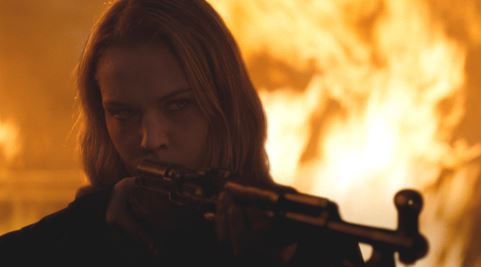
Of course, the script ruins that seconds later when she just… shoots him anyway? Also, and this is a violently American thing to say, but did they have to use the wimpiest sounding gun possible?
I think that Hugh Dancy as Aiden was the standout performance of the movie. He portrayed Aiden as playful, sweet, and resourceful, and his switch from sensitive artist to unlikely badass is nicely set up with his story about defending himself against his abusive father. I also think that he and Bruckner have some decent chemistry. Say what you will about the romantic fountain montage - they look like they’re genuinely enjoying each other’s company.
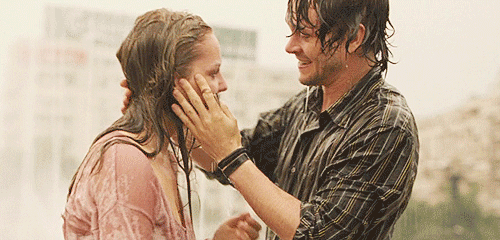
Also, he spends the last half of the movie bruised and slightly bloody, and I don’t mind that at all.
As for the rest of the cast, I think they gave fine performances despite the material that they had to work with. When movies fail, there seems to be an impulse to blame the cast and rip their performances apart – but I won’t. I don’t blame the cast for the commercial and critical failure of this movie – I blame the people who had actual creative control (the producers, director, screenwriters, etc.).
o The Concept: An ancient dynasty of werewolf leaders extending from primeval Europe into the modern day? Yes fuckin’ please! This is exactly the kind of canon expansion that I was craving from the book! And, okay, yeah. The book’s version of werewolf society is very different from the movie’s version. In the book, werewolf packs are moderately sized clusters of families and individuals ruled by an alpha pair. Other werewolf packs exist, but there doesn’t seem to be any person or group governing werewolf society as a whole. This would seem to directly contradict the movie’s take on werewolf society, but it doesn’t have to. The book’s werewolves originated in western Europe, and from there emigrated to the US in the 1600’s. The movie’s werewolves originated in eastern Europe and stayed there. There’s no reason why those two groups of werewolves couldn’t have started with or evolved two different social structures leading up to the present day. In fact, if you can ignore the shared titles and character names, the movie Blood and Chocolate can be viewed as a new story set in the fictional universe established by the book Blood and Chocolate. And that’s how I choose to view this– it lets me get past my nerd rage and enjoy the movie for what it is.
Lows: While I do honestly enjoy this movie, I would be lying if pretended that it was flawless. Blood and Chocolate didn’t get its reputation by accident. Here are my thoughts on some of the more egregious missteps. o The Script: Okay guys, we need to talk. I’ve seen people defending this movie, saying that it’s an unfairly maligned gem, and I CAN’T. Guys, the dialogue. Have you LISTENED to the dialogue?
Aiden, pleading: “I’ll take the train, I swear it. I’m gone. I’m on that train.”
Rafe: “I AM THE TRAIN!”
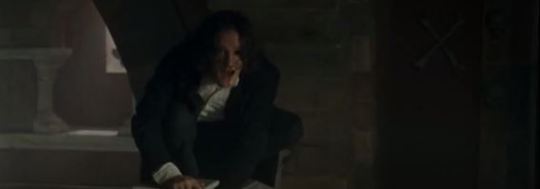
(Boy, WHY are you crouching on the railing like a heterochromatic gremlin?)
Like I said in the last section, I don’t blame the actors for the movie’s failure. I don’t. They had no control over this shit. I do, however, blame the screenwriters; all SIX of them. This film had SIX separate people working on the script and was still released with Hugh Dancy shouting, “If you cared a goddamn thing about me, you would have left me before we ever met!”
This is astonishing for its misunderstanding of linear time if for nothing else.
Seriously, though – Hugh Dancy, cinnamon roll and internet darling, cannot make these lines sound good. When even the best actor in your movie can’t make it work, you know that the script is baaaaad.
o The Wolves: Remember the bit about practical effects vs. CGI in the previous post? Yeah, the filmmakers went hard on the CGI. It made sense given the relatively small budget to go the CGI route as a money saving maneuver. However, the director, Katja von Garnier, decided to use the CGI in the most ridiculous way possible.
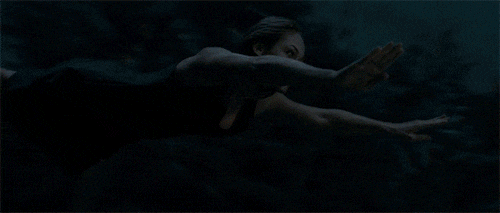
(🎶 FIGHTING EVIL BY MOONLIGHT! 🎶)
The werewolves jump into the air, turn into an ethereal glow, and emerge as wolves. While this is not an inherently bad idea (it’s different, and it could, in theory, look cool), the execution was a huge misfire. Seeing the actors leap forward into a sparkly, pastel shimmer was never anything but ridiculous, and the Sailor Moon aesthetic of it just did not fit with the grungy, realistic look of the rest of the movie.

(Hey, cinematographer: if you want these transformations to fit with the rest of the movie, maybe make the movie LESS F*ING BROWN?) Additionally, the transformed werewolves were simply real wolves. Listening to Katja von Garnier’s commentary, you come away with the impression that she is suuuuuper proud of getting the cast and crew to work with live animals. However, the wolves that they used are a bit on the smaller side.
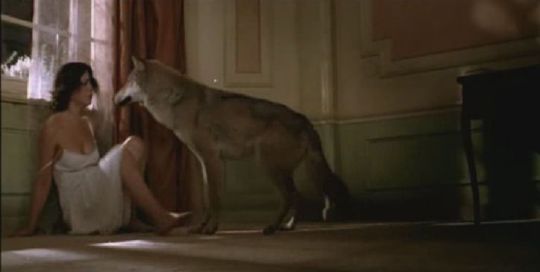
As a result, they didn’t really inspire much fear. For example; in the scene where Rafe murders the girl he’s been stalking, you see both the girl and the wolf in the same shot, and it absolutely kills the tension. Like, girl - roll up a newspaper and boop him on the nose.
o Rafe: The screenwriters desperately wanted Rafe to be menacing, and bless Bryan Dick for trying, but it does not work at all. Rafe in the movie is petulant, sleazy, definitely an asshole, and explicitly a murderer, but I never believed him as a threat. In the confrontation at the chapel, Hugh Dancy stands half a head taller than Bryan Dick, and while neither of them are exactly musclebound, it’s pretty obvious who would win in a fight. For me to buy Rafe as a legitimate danger, he needed to be less foppish, more unhinged, and just physically bigger.
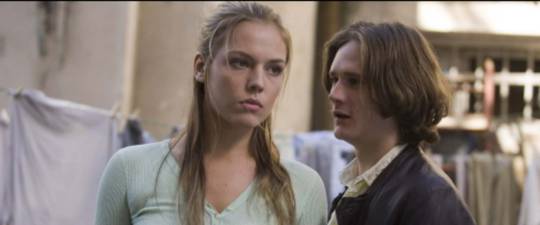
(FFS, Vivian is taller than he is! How is he supposed to be intimidating?)
o Gabriel: I don’t know who decided to turn the romantic lead of the book into the jealous villain of the movie, but they need to be slapped across the face with a trout. It’s been over a decade since the movie came out, and I have learned to shrug off most of the bizarre adaptational choices, but this one still just pisses me off. The evisceration of Gabriel’s character is the biggest betrayal of the source material.
In the book, Gabriel was a foil to Aiden, and Vivian choosing Gabriel symbolized her acceptance of her dual nature. It meant that she wouldn’t have to compromise her identity to be accepted and loved. The adaptation could have provided an opportunity to rework Gabriel’s character arc. It could have cleaned up the age-gap ickiness, removed the non-consensual kiss, nixed the prior relationship with Vivian’s mother and generally made Gabriel as a love interest more palatable for movie audiences. But, whatever. The filmmakers already threw out the core of the human vs. animal theme from the book, so why not just utterly warp Gabriel while they’re at it? Plus, the clueless human love interest vs. the lecherous supernatural stalker dynamic worked for Underworld, so it’s going to work here, right?
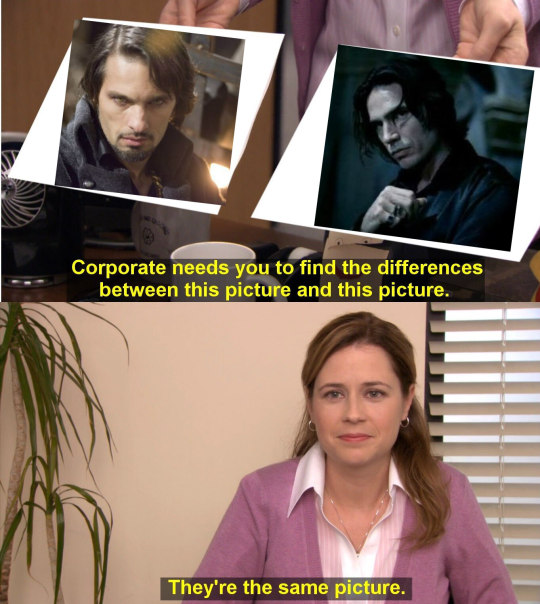
The Stuff I’m Choosing Not to Nitpick (in depth): I just- I don’t know, man. I used to get really worked up about this stuff, but I don’t really feel like devoting any real analysis to these points. Take these potshots and do with them what you will.
o The Parkour: Time has not been kind to parkour. The filmmakers gambled on it being cool for the long haul, and they lost that wager. I get that it takes a lot of skill, and I get what the filmmakers were trying to do with it, but it just looks silly. o The Hunt: I mean, it directly violates the most important werewolf law from the source material, but I’m willing to believe that this ancient werewolf faction in Romania came up with a sanctioned way to hunt humans, so I can forgive this. o The Eye Thing: The early-mid aughts were really impressed with the power and symbolism of colored contacts, weren’t they?
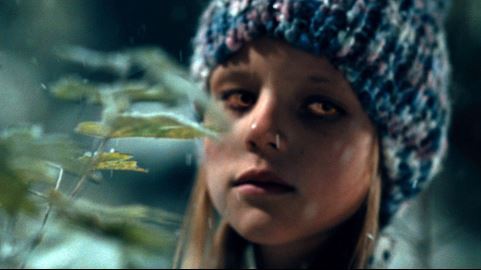
o Astrid: They mashed Astrid and Esme’s characters together and called the resulting chimera Vivian’s aunt. I don’t hate this change as much as I used to. I mostly just wonder why they bothered. The movie had already changed the book’s storyline so much that neither Astrid nor Esme were necessary for the new plot. They could have cut this character out entirely and no one would have missed her.
o The White Wolf: Of course the main character turns into the only white wolf in the movie. ‘Cuz symbolism!
o The (implied) Sex Scene: Sure, she’s dying of silver poisoning, you’re both hiding in a decrepit film warehouse and the werewolf mafia is hunting you, but GO AHEAD. This is the ideal time AND place to bone!

(This woman is clearly DTF.)
Verdict: I want to be really clear on this point – I love this movie. I mean, let me remind you of my cinematic tastes.
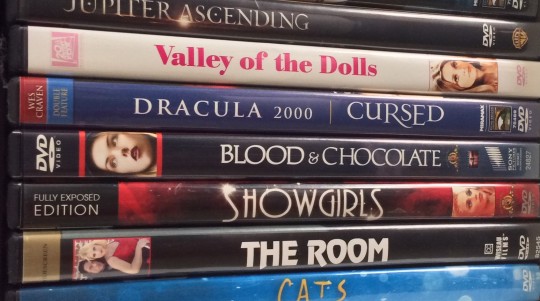
Here’s the thing - there is a difference between movies that are “good” and movies that are “enjoyable”. Blood and Chocolate is not a “good” movie. The plot is formulaic as hell, the dialogue is laughably inept, and any actual potential it had to do something new and innovative with the werewolf genre was squandered. Seriously – one of the remarkable things about the book was how it centered a monster story on the monsters and made them sympathetic. The movie? Turns the monsters back into one-dimensional bad guys. But, hey, at least they made the transformations maaaaaaagical! That said, Blood and Chocolate is absolutely an “enjoyable” movie. I have watched this thing dozens of times since it came out, and each time I find something new to amuse me. The dialogue is hilarious, the special effects miss the mark so badly, and every time you find a new plot hole, an angel gets its wings. What’s more, it contains enough genuinely good elements to balance out the bad. It is a delightful example of low camp, and a worthy addition to any “so bad it’s good” film collection.
I’m not alone in that assessment, either. If you look at amateur reviews of the movie, you’ll find a lot of people defending it despite its flaws. It has an audience!
So, why didn’t it make more money?
Next Week: Section 4 – The Autopsy
#blood and chocolate#annette curtis klause#werewolves#katja von garnier#agnes bruckner#hugh dancy#olivier martinez#B&C-AAINO
19 notes
·
View notes
Text
Disney+ What To Watch: My Top 10 Favourite Disney Live-Action Remakes

So we’ve covered the main Walt Disney Studios animated movies, and I am trying to find categories that I can slot other Disney animated movies into, but for now we are going to follow Disney’s latest trend and jump into the live-action field with my personal favourite top 10 live-action Disney remakes.
Now of course Snow White and the Huntsman will not be on this list primarily because it is not a movie released by Walt Disney Studios and also because it took me three attempts just to get through it. But I will also not be including sequels as they are not reworking animated movies but continuing the stories of the remade live-action movies, so 102 Dalmatians, Alice Through the Looking Glass and Maleficent: Mistress of Evil are also not in contention.
Also remakes of live-action movies, even if those live-action movie are in some form animation hybrids, also will not count, largely because I am only counting those under the official Walt Disney Animated Studios banner but also because there’s no real point.
As always please remember that these rankings and opinions are purely my own, I am not saying these movies are factually worse than others or better than others I am merely saying this is how I view them.
#10. The Lion King
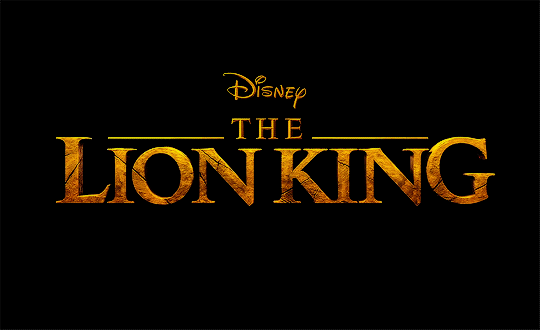
The reasoning for this movie being at #10 despite how well it has done compared to other live-action remakes is purely because I had to check and make sure the title gif I am using for this entry was the one from the live-action remake and not the 1994 animated movie...I should not have to do that!
The problem this movie has, as many critics and fans have pointed out and I believe as I did in my review, is that this is effectively a shot-for-shot remake of said original animated movie. That doesn’t mean it’s not good because the original was a phenominal piece of cinema for the genre and the studio, but it does leave a question as to the relevance of bothering to remake something practically identical with the only USP being that this movie is completely CGI in an attempt to give it the “live-action” treatment.
That being said, I was somewhat entertained by this movie, but by different parts than how I was in the original. For instance, in the original Rafiki was my favourite character in terms of comedy and just as personal preference, here he barely gets anything to do and instead the likes of Sarabi and the Hyenas are more fleshed out.
I did enjoy how the Hyenas showed more of a pecking order in this version, with Shenzi this time being depicted more as the clan leader who is somewhat of a left-hand to Scar in the same way that Faora was to Zod in Man of Steel.
Also Sarabi, who is somewhat forgettable in the animated movie as she’s barely in it until really the end to the point where me saying she was Simba’s mother is the only real jolt some fans may have to remembering her, and the other lionesses had that one really tense scene with Nala trying to escape Pride Rock without being detected by the Hyenas and Scar in order to find help. I can imagine that being a very hard level on the game-version of this movie because I always hated stealth levels like this particularly in the earlier Harry Potter games.
Timon and Pumbaa come in and kind of steal the show half-way through and notably there is a bit more of them raising SImba even as an adult and both Billy Eichner and Seth Rogen do respectable jobs in their respective roles, in fact some have argued they are the best part of the movie because they bring some level of excitement to an otherwise bland remake.
To be fair, one of my favourite parts is when Timon begins to sing “Be Our Guest” as a way of distracting the Hyenas as live bait along with Pumbaa, this of course is reworked from the original when it was them performing a hula-inspired performance which I still love to this day, but this reworking did make me laugh.
Outside of that though, everyone really fills their roles as they did in the original, and it comes across as simply a pale imitation in comparison. It’s not like the other remakes where there was something new enough and exciting enough to differentiate the two. Yet this movie is longer than the original because the stuff that either is new or extended from the original feels like it has just been either shoehorned in because maybe the writers or Favreau himself believed they were lacking in originality or maybe they believed what they actually had was exciting.
The biggest misstep of this type is the almost three minutes spent following a piece of Simba’s mane on its journey from falling off Simba to reaching Rafiki and thus him discovering Simba is in fact alive. In the original, this wasn’t even a 30 second segment and they played up Rafiki’s shamanism a lot more to deduce this fact, but here the hair goes from river, to birds nest, to a giraffe’s digestive system, to a ball of dung, to an ant line until finally reaching him...all the while only promoting the admittedly impressive CGI.
Another example of this is at the beginning of the movie where there is more focus on the field mouse that Scar toys with before losing the opportunity to make it lunch, we spend a good 30 seconds to a minute more than the original as the mouse makes its way up to Scar’s den rather than simply starting off there. I don’t feel this is as big an offence as I do the hair scene but the time could easily be spent elsewhere.
There’s also, I feel, a disadvantage with trying to make these animals as realistic as they did. 2019 struggled with “realistic” CGI animals from The Lion King to Cats and Sonic the Hedgehog, and while Sonic fixed itself by having the titular protagonist’s design changed to a more accurate look, it is a shame that The Lion King did not also have the same idea because giving these lions more animated features may have helped show the emotional hot points of the movie, particularly Mufasa’s death and the emotion on Simba’s face.
It’s also a shame that the voice actors are underwhelming outside of Billy Eichner and Seth Rogen. I do appreciate that they cast regionally-appropriate actors for the most part, even bringing back James Earl Jones for one of his two most famous roles, but there in lies the problem, he simply performed an almost line-for-line redo of what he originally did in the animated version. It’s great hearing him again but I could have just watched the original again to hear him not do anything different.
You also have Beyoncé who fails at both scene-stealing acting and singing performances with her new original song which is hardly in the movie. However, while Beyoncé still delivers on star quality, she also outshines the movie’s main lead Donald Glover who feels like an acting school work experience placement compared to Beyoncé.
Finally the music, forget the rolling turn of mane, this movie butchers and wastes one of the best Disney Villain songs in history by having Chiwetel Ejiofor talk his way through one chorus line of “Be Prepared”...next to that having a lackluster shot-for-shot remake of “Circle of Life” didn’t seem so bad.
Overall, this live-action remake simply felt more like fan-service or even like Jon Favreau was too scared to touch what had come before and so just decided that simply having a fully CGI version of an animated classic was enough...but aside from simply looking at it, there is nothing really wondrous about this movie.
I can see why people like the movie, but I can’t really understand why people defend the movie even from a nostalgic point of view, I mean seriously just watch the original version you’ll get the same feeling out of it.
So what do you guys think? Post your comments and check out more Disney+ What to Watch Top 10s as well as more Top 10 Lists and other posts.
#the lion king#the lion king 2019#disney#disney+#disney plus#disney+ what to watch top 10s#disney+ what to watch#my top 10 favourite disney live-action remakes#disney live-action#disney live-action remakes
2 notes
·
View notes
Text
5 Spoiler-Filled Ways “Rise of Skywalker” is the Last Jedi Remake Neck-beards Demanded

“The goal is to not make one half of the fandom happy over the other, it is to make a film that the fandom in general as a whole enjoys. “
These words were taken from the manifesto posted on Remakethelastjedi.com (which somehow never managed to produce a film despite getting over $417 MILLION dollars “pledged” towards the effort (lol).
It is very telling that nowhere on the site does it mention anything about artistic integrity. Or communicating a theme. Or even quality movie making (cinematography, acting, dialogue, etc). Because the Last Jedi meets all those criteria, actually. The entire crux of the argument against the previous film is “Star Wars belongs to the fans, and you didn’t give all the fans what they wanted, so we’re upset.”
It is therefore pretty deflating to watch “Rise of Skywalker” make so many efforts to undo the brave and controversial changes Rion Johnson made to the “Star Wars formula.” If ever there was a movie to prove Martin Scorcese right, this is it. Not only does this movie refuse to “Let the past die” (as Kylo Ren so eloquently put it), it figuratively and literally resurrects every tired old trope that has made Star Wars such a predictable franchise over the last dozens or so films. Here, submitted for your disapproval, are the “fixes” JJ Abrams made to “The Last Jedi”, despite never actually being broken in the first place.
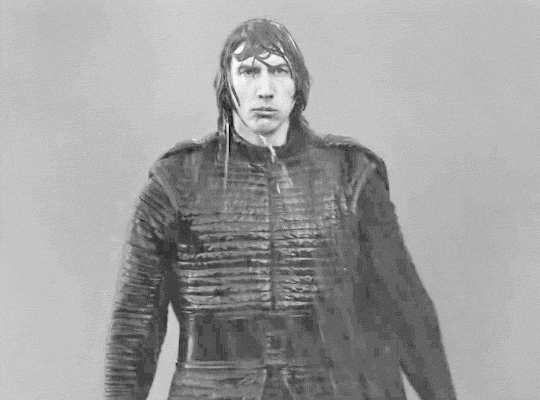
1) This movie needs a Vader, dammit I love the moment in The Last Jedi when Kylo Ren smashes his stupid dollar-store-knockoff Vader cosplay helmet in a fit of rage. That was the precise moment in which I could tell this film was going to do something different. The villain in this story was going to have a face. And a personality. And be an actual character. But no, said JJ. Make the bad guys literally glue it back together. We need to sell some Halloween costumes, dammit.
2) The Universe Shouldn’t Feel Too Large
Perhaps my favorite plot twist of TLJ was in regards to Rey’s parents: they weren’t anyone special. They were not a Skywalker. Or a Sith lord. Or Jar-Jar Binks’ babysitters. They were just selfish jerks who abandoned their child. But in that pain lies a powerful message: you are more than your heredity. And you determine your own destiny. But no, said JJ. Make her a long lost child of Palpatine. And literally call the previous script a lie. Because a story that takes place across an entire galaxy should really only focus on the same five people. 3) Mysticism is Really, Really Important. Like, SO Important. I loved the moment in TLJ when Yoda burns the “sacred texts” that Luke had been protecting for decades. It was such a fun reminder that belief and spirituality matter very little if they are not followed up by action; particularly, brave and altruistic action. But in case you were one of the few who were actually upset by Yoda disrespecting a relic you never knew existed 20 minutes prior, Rise of Skywalker gives you plenty fancy magic items and abilities to read about on Wookieepedia. Treasure maps in the shape of conveniently found cutlery. Weird diamonds that point the way toward evil, like Captain Jack’s compass. Strange underground rituals that have apparently been destined for a millennia but that can ALSO be changed on the fly to fit the needs of the movie’s laborious run-time. It all comes across like an Indiana Jones movie, and not one of the good ones.

4) Characters Should be Simple and Easy to Predict
Luke tossing his own lightsaber into the ocean. A polarizing moment, but one I adored. It showed me that in this version of Star Wars, people change. They’re flawed. And they don’t take EVERYTHING seriously ALL THE TIME. They are, to put it simply, people. But in Rise of Skywalker, the galaxy far, far away is returned to simpler times. The villain is an evil wizard who wants to do evil because he’s evil. The hero is a symbol of unwavering good who never, ever makes the wrong or selfish choice. The mentor characters are wise and chaste, and the lovable scoundrels have ex-girlfriends on distant planets who are so salty he broke their hearts. It’s classic Star Wars, alright. (aka, kinda boring)
5) Cram in as Many References as Possible
Perhaps the biggest misstep of the Star Wars franchise is the oft-repeated mistake of thinking that establishing connections to beloved narratives is more important than being memorable or original. So we got characters like Jango Fett (totally devoid of personality) and ridiculous explanations for how Han Solo got his name. The Last Jedi was a deeply weird but wholly fresh story, with a strange animal-rights sub-plot and a final battle that didn’t actually take place. But if that was too unfamiliar for you, JJ Abrams is here to throw so many winks and knowing nods at the fandom that they couldn’t POSSIBLY find something to complain about. The number of inside jokes clouding the script are almost too many to count.
6) Be Woke, but not Too Woke
Just to make sure JJ Abrams didn’t lose the new Star Wars fans who were actually excited to see the series defy gender norms, RoS makes a lot of strange attempts at being progressive, but never in the forefront. Half the Stormtroopers have female voices. A new planet of peaceful allies has decidedly Muslim influences. And then there’s that lesbian kiss.But none of these elements are ever important, and are kept just enough on the sidelines that the far right audience can choose to ignore it. Like “Beauty and the Beast” and “Avengers: Endgame,” this movie wants you to think it’s forward-thinking, but its not brave enough to prove it.

And in case you are now feeling the need to “strike me down,” let me end by saying this: I actually enjoyed Rise of Skywalker. Once I realized it was going to be a pretty dumb movie (about five minutes in), I was able to sit back and enjoy the big, loud, occasionally funny, often emotional spectacle. I just wish the good movie that could have been hadn’t been force choked to death by the collective clammy fist of the Star Wars subreddit.
Oh well. At least there’s one more episode of The Mandalorian...
#star wars#rise of skywalker#kylo ren#rey#jj abrams#rian johnson#Disney#the last jedi#the mandolarian
3 notes
·
View notes
Text
A Buffy rewatch 7x16 Storyteller
aka the lies we tell ourselves
We did it, guys! We made it to the last season! Also, hello if you’re new, and stumbled upon this without context. As usual, these impromptu text posts are the product of my fevered mind as I rant about the episode I just watched for an hour (okay, sometimes perhaps two). Anything goes!
And in today’s episode, it’s Andrew time. So I guess we’ll need to talk about him, huh?
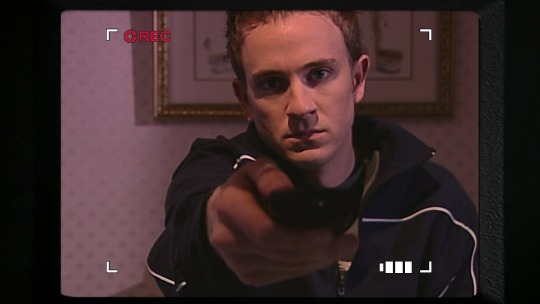
I’ll just get this out of the way right away: I’m not big on Andrew. I know that he’s well-loved by a lot of folks, and also, that I’m not alone in having a bit more resistance towards him… (So, he’s basically like each and every Buffyverse character ever? Except Warren – we all hate Warren.) And I get it. Both of those sides, I guess.
It’s not that I hate Andrew though. It’s just that there’s a reason why he was part of the Trio, and while I think there’s a lot of interesting narrative fuel there, I have a hard time forming a deeper connection to those characters. Including Jonathan.
But much like Superstar was an interesting, highly enjoyable Jonathan-focused episode despite any future misgiving I might’ve had of the character, Storyteller does the same for Andrew. There’s a lot to like here, and we build on Andrew’s character massively.
Andrew, in this episode in particular, is presented as an audience surrogate - one of his character’s biggest appeal imo. He understands and appreciates that he’s in a story, surrounded by all these larger than life characters. Buffy is the hero. Xander is the unappreciated sidekick that Andrew stans, and has a crush on. Dawn is a cutie with a weird backstory. Willow and Anya have these rich, ambiguous, dark patches in their past. Spike has… abs, I guess?
The way Andrew integrates himself into these stories is where things get interesting though.
He mostly sees himself as an outsider, a storyteller, and therefore detached from the actual canon world of the show. And when he does integrate himself, it’s just another story, another character. And as Andrew tells the tale of this person, who looks like him, and sounds like him, the story changes with the narrative.
You see, Andrew didn’t want to kill Jonathan. That’s not what happened. It was an accident! He was possessed! It was what the story wanted him to do! He had no agency whatsoever.
Which… is pretty meta. But in the world of the show, it’s Andrew lying to himself about what he’s done and why. About who he is.
So, maybe it’s part of the gay subtext, too? Except... is it subtext? Is it, really?
Is Andrew relentlessly gay-coded, or is he just gay on the show? How is that a taboo, when we already have main queer characters in the cast? Are they not textually acknowledging it because it’s so clearly the case, or are they playing coy for shits and giggles? Is it supposed to be funny?
It’s all a bit murky with the intent. But I do think that there’s a more favorable perspective here somewhere. The scene where Andrew is re-playing Xander and Anya’s exchange is a bit weird and obtrusive, but there’s no actual joke here about how Andrew’s clearly using it to fantasize about Xander. It is weird and obtrusive because he recorded them having this intimate conversation, yes (which, again, is more meta than anything else…), but not because he has a crush on Xander.
So, that’s something.
Staying on topic here, did we seriously break up Willow and Kennedy for 1 whole minute of overall runtime? Are the writers intentionally making Kennedy’s character to be as thin as tissue paper? After the end of the previous episode, were they immediately like ‘oh, shit, now we have to build her character to explore this and get them back together, quick, let’s have them make up offscreen at the beginning of the next one’.
And I guess I kinda appreciate the background storytelling element of it all. To just have them reunite as one of those side stories we don’t see, because we’re so locked to Andrew’s perspective. Kinda? Maybe?
Mostly though, it’s just cheap and lazy.
Seriously, I don’t even care about Kennedy, truth be told. Or this relationship. I’m okay with it because I like Willow and I want her to have nice things, and not be miserable. And I guess the writers are aware of this, but still. They’re not even trying at this point.
This is also the episode where Xander and Anya don’t get back together. But they do have sex. Now, this is a relationship where I am actually invested in both characters – just not necessarily in them, as an item. It’s all… *shrug emoji* The whole having sex to get over each other is a nice callback to how their relationship started out in the first place though.
Speaking of callbacks, the high school going all Hellmouth-y had some nice moments of that too. Like Buffy stopping a shy girl from going invisible. The scene with the nervous guy apparently actually exploding into bits and pieces was a bit extreme for the comedic tone of it all, but that only made it even more of a S1 homage.
And then there’s the scene with Andrew and Buffy over the Hellmouth seal.
There are things about Storyteller we could dissect, and I could sit here talking about my own ambiguous feelings on Andrew all day, but this scene? This scene is one of the best of the season and no, I’m not taking any constructive criticism.
It’s a great character building moment for Andrew, but we’re also adding to Buffy’s character too.
The episode earlier already lampshaded the Season 7 Buffy Speeches counter that I talked about earlier, but here, Buffy also acknowledges it.
ANDREW: “You said we could all get through this.” BUFFY: “I made it up. I’m making it all up. What kind of hero does that make me?” ANDREW: “No, you’re doing great. Really. Kudos.” BUFFY: “Yeah? Well, I don’t like having to give a bunch of speeches about how we’re all gonna live, because we won’t. This isn’t some story where good triumphs because good triumphs. Good people are going to die! Girls. Maybe me. Probably you. Probably right now.”
And I said at the beginning of this post, that I’m not big on Andrew, but the truth is? This episode gets to me. This scene gets to me. And every time I watch it, I like Andrew a whole lot better.
…That is until I rewatch season 6 again, and he plummets back into his starting point. It’s a vicious cycle.
But maybe I’m looking at it in the wrong way. This isn’t a cycle after all. This is part of the show’s themes about change and hope, and giving people the chance to grow.
It is, after all, Andrew’s tears that close the Hellmouth. His tears of regret. He admits to and acknowledges what he’s done, and it breaks the cycle of evil for the time being. It doesn’t change what happened, but it does change him. By taking responsibility, he takes charge of his own life instead of playing a character in a story.
Andrew may have stopped following the First’s instruction a while ago, but by not taking action, by being a spectator, he was still an agent of the First. No wonder then, that him breaking out of that state weakens the First as well.
Huh. Maybe I’m just underestimating my own attachment to Andrew after all.
We can all do better if we’re allowed to change. But we also need to be honest with ourselves and acknowledge our missteps in order to do that. Otherwise, we really are just in a vicious cycle, doomed to repeat our worst mistakes.
So... be more like Andrew, and break that cycle, I guess?
2 notes
·
View notes
Text
Outlander Season 4
Some Musings and a Plea to Stop the Hate
Way back in 2014, it seems like ages ago now, I kept seeing ads on goodreads for a new show, based on a series of books, called Outlander. Intrigued by the gorgeous promo art, I googled it to learn more. Lo and behold, the first episode was available to watch for free on Starz’ website! I watched ‘Sassenach,’ then immediately bought the book. I couldn’t wait for the rest of the show to premiere, I had to read the story now. By the time episode 8 aired, I had finished reading the first four books.
I may have been pulled into the Outlander-verse because of Jamie and Claire, but I have stayed for Roger and Brianna. At the time I read it, Drums of Autumn was the first book in a very long time that I found so engrossing I stayed up very late to read because I just could not put it down (one more chapter...). I had to know if Roger would find Brianna in the past. And after they fought and were separated, whether they’d ever get back to each other. I fell in love with Roger and Brianna in Drums of Autumn, as separate characters and as a couple. So, I’ve been patiently waiting for four years to finally see this book brought to life on screen. Now that Season 4 is over, I wanted to reflect on what I loved and didn’t love about this season.
“I don’t belong here,” I said softly. “Brianna, Roger … they don’t belong here. […] But we are here, all of us. And we’re here because I loved you, more than the life that was mine. Because I believed you loved me the same way.”—A Breath of Snow and Ashes
Drums of Autumn, the book on which this season was based, is really a turning point in the Outlander story. Gabaldon has always masterfully crossed the boundaries of genre, blending romance, historical fiction, and magical realism into all of her books. Outlander, Dragonfly in Amber, and Voyager were all epic adventure romances. Family Saga can be added to the list with Drums of Autumn. Jamie and Claire finally have a place to settle with their family. As Jamie and Claire get settled into their new life on Fraser’s Ridge, their family grows—Fergus, Marsali, Germain, Murtagh, Jocasta, Ian, Lizzie, and most importantly, Brianna and Roger. As Jamie and Claire’s family grows, the Outlander story expands to accommodate these new characters. Jamie and Claire are no longer alone. The people that they have surrounded themselves with need them. The story shifts focus from Jamie and Claire’s undying love for each other to Jamie and Claire doing everything in their power to protect and cherish the family around them. In Drums, there are no real threats to Jamie and Claire’s relationship. They’re solid. Instead, the story’s conflict revolves around their daughter, Brianna, and the man their daughter loves, Roger. Drums is Brianna and Roger’s crucible. They both endure terrible hardships and come out the other end surer of themselves and who they are at their very cores.
I loved Season 4 just as much, if not more, than Season 1. There are several episodes that I will re-watch over and over again, which is not something I could say about most episodes in Seasons 2-3. I loved, and would re-watch, ALL of the episodes in Season 4 except ‘America the Beautiful’ (too boring), ‘Do No Harm’ (too emotionally taxing) and ‘Common Ground’ (too boring). Once I got over my disappointments with ‘The False Bride’ and ‘Down the Rabbit Hole’ (which I will get to in just a second), I was fully engrossed in this season and eagerly waiting for each new episode to be added on Saturday night.
So, I thought the show did a decent job of adapting Drums of Autumn for the screen. There were missteps and some odd writing choices along the way. But, in retrospect, I see why they made the changes they did and I understand the overall character arcs. That being said, I still want to discuss two of the biggest disappointments for me this season. These changes had the biggest negative impact on my own perception of the season. My view of the season as a whole, though, is very positive.
“…he thought perhaps it didn’t matter that they faced in opposite directions—so long as they faced each other.”
By far my greatest letdown of this season was how Roger and Brianna’s relationship was condensed and written, particularly in ‘The False Bride.’ We haven’t seen these characters since Episode 5 of Season 3, ‘Freedom and Whiskey’, which aired more than a year before ‘The False Bride.’
“Drums of Autumn, the novel that corresponds to this season, is the book where Roger and Brianna become main characters. It would make sense to tell their stories in a parallel manner to that of Claire and Jamie, echoing the back-and-forth from the 18th to the 20th centuries that made the first half of season 3 so memorable.” (Source: TV Kills Time)
If not a back-and-forth, then I think there should have been at least one more early episode in which they were heavily featured so that their relationship could develop in a believable way and the audience could become invested in them as a couple. I think ‘America the Beautiful’ was slow enough that they could have easily included Roger and Brianna, and doing so would have established that these two are major characters in Season 4. Or they could have been featured in ‘Do No Harm’ to give viewers a bit of a break from the heavy emotional stuff Jamie and Claire were going through in that episode. If I had done the story outline for their relationship this season my two early Roger and Brianna episodes would look like this...
Episode 1: Roger and Brianna awkwardly reconnect after the events of Season 3. They’re shy around each other at first, but by the end of the episode it’s obvious something serious is developing between them. They decide to give a long distance relationship a shot. (Possible book story to include: Roger and Brianna go to the Scottish Festival, Roger meets Joe Abernathy)
To indicate time has passed and they’re in a serious long-distance relationship—either at the end of Episode 1 or the beginning of Episode 2—there’s a montage of them picking each other up at the airport to visit each other, writing letters, and talking on the phone.
Episode 2: Since Roger visited Brianna in America in Episode 1 (and in ‘Freedom and Whiskey’—seriously, who shows up uninvited at Christmas?), Brianna needs to visit Roger in Scotland, so it doesn’t look so much like Roger is pursuing Brianna. By this point, they’ve established this is a serious relationship, so a proposal from Roger wouldn’t seem so ridiculous. Even though Brianna rejects his proposal, they part on good terms—Roger understanding that Brianna isn’t ready, and Brianna understanding that Roger is committed. (Possible book story to include: Brianna visits Roger at Christmas, hallway makeout session, romantic walk after Christmas Mass, proposal)
The fight at the end of ‘The False Bride’ was incredibly frustrating because I knew that they would be fighting again in ‘Wilmington,’ and the way the fight unfolded came across way too adversarial. I never interpreted Roger and Brianna as clashing in the books. I always thought of them as young, inexperienced, and prone to miscommunication because Roger is so forthcoming, while Brianna is very guarded. They should have ended ‘The False Bride’ on a more optimistic, hopeful note. Considering that Roger and Brianna both endure so much hardship in the second half of the season, did they really need to add fuel to that fire? No. Writing the fight the way they did had ramifications for the rest of the season—from their handfasting not being believable in ‘Wilmington,’ to viewers questioning why we should be rooting for them to be together, to people not caring about, or even hating, Roger.
I’ve written about my disappointments with regards to Roger and Roger and Brianna before, so I’m not going to rehash all that here. But, if you’re interested in reading more of my thoughts on the matter, check out this post and this thread.
All that being said, I genuinely loved the Roger and Brianna story line from the handfasting forward. I didn’t even mind how the fight was written at the end of ‘Wilmington.’ (He left because she told him to go people!) I just wish that ‘The False Bride’ had ended differently, so this corner of the Roger/Bree fandom was a bit larger.
“She had set out thinking only to find her father; she hadn’t realized that she might discover a whole new family in the process.”
My second biggest disappointment this season was the writer’s decision to cut Brianna at Lallybroch. I understand what the writers were intending in ‘Down the Rabbit Hole’—to draw parallels between Frank/Claire and Laoghaire/Jamie. I still believe this is a really weak connection to make, and not in the spirit of what Brianna is going through at this point in the book (transitioning from Randall to Fraser and bonding with her Scottish family). I loved all the Frank/Brianna flashbacks, I just thought they felt out of place in this episode. It would have been better to include all the Frank scenes in ‘Blood of my Blood’ and juxtapose Frank/Brianna with John/Willie. Frank and John raised Jamie’s children. That’s a motif worth exploring, and a much stronger parallel than Frank and Laoghaire. That way, Brianna’s already processed her complicated feelings about Frank by the time she arrives in Scotland, and she’s ready to meet Jamie. By the end of ‘Down the Rabbit Hole,’ viewers should have been excited and on the edge of their seats anticipating Jamie and Brianna’s eventual meeting. Instead, most viewers were confused about why we just watched an episode focused on Outlander’s two most polarizing characters: Laoghaire and Frank.
In my opinion, the Laoghaire drama just completely overshadowed the episode, and Roger’s scenes in particular. This is supposed to be a moment of growth for Roger, who is demonstrating great moral character by standing up to Stephen Bonnet and risking his own life to protect Morag and baby Jemmy. This episode could have changed viewers minds about Roger, but it didn’t. And I wish there had been at least one scene of Roger doing something, anything, more strenuous than hanging a lantern. Oh, and don’t even get me started on that fucking beanie. So, yeah, ‘Down the Rabbit Hole’ was not my favorite episode, even though I thought I would love it because...Roger and Brianna!
If you’re interested in reading any more of my episode thoughts, here are some links:
Down the Rabbit Hole (Part 1, Part 2, Part 3); Wilmington; The Birds and the Bees; and Man of Worth.
So, I had my disappointments with the show this season. But far more disappointing than anything the show writers ever did was the critic’s and fan’s reactions to this season. I have never in my life read so much hate directed towards a TV show. Reading some of the vitriol online, you’d think the show was a complete garbage fire and everyone involved in its production moronic, selfish bastards who are conspiratorially creating a garbage show to troll fans. So I ask...
Is this show GOOD? And who decides if it’s GOOD, anyway?
Outlander has never been, nor will it ever be, the best show on TV. It has never been, nor will it ever be, a critically acclaimed masterpiece worthy of awards and accolades. Of course, the actors are amazing, the costumes are superb, and the set design can be well done, and it’s one of my personal favorite shows. But this is just not the type of show with mass appeal or the type of show to garner praise from critics (who aren’t necessarily fans) who are paid to analyze the show and determine if it’s “good.” What they deem “good” TV is not necessarily what I, or you, would deem “good” TV. It’s just too subjective. Anyway, the source material the show is adapted from is weird, meandering, melodramatic and sometimes boring. It’s inevitable that some of those qualities will seep into the TV show. I don’t enjoy every chapter of the books, and I don’t enjoy every episode of the TV show. I don’t expect to. And I don’t expect critics, especially critics who haven’t read the books, to enjoy the show, either. Just because someone writes reviews for the New York Times, doesn’t mean they are the ultimate authority on what’s good or worth watching. I have read much more thoughtful and meaningful analyses of the show here on Tumblr than on more well-known outlets, whether major news sites or fan-run sites like That’s Normal. Shout out to Connie at TV Kills Time, whose “Deep Thoughts” on Outlander are always perfectly balanced and eloquently written.
The show had a lot of buzz in its first season, Caitriona’s been nominated for Golden Globes, and I think the costumes have received or been nominated for awards as well. And that’s great. I love when a show I love gets recognition. But, I don’t think a critic, or an awards panel, can tell me what TV shows I should love. Plus, these critics are tasked with reviewing the show after every single episode, without the full context of the entire story arc of the season. I think this media culture of reviewing each episode of a TV show has changed how we watch television. Each episode is dissected and analyzed to pieces as if it’s a movie, with the expectation being that each episode stand alone as a terrific work of fiction with its own narrative arc. Which is nearly impossible to achieve with any show, but especially with a show like Outlander, because there are just so many characters and so much plot to cram into 13 distinct episodes. Don’t get me wrong. I want each episode to be good on its own. But, I also understand that the episode has to fit within the season as a whole. And I don’t expect each episode to thrill me and delight me.
Moving on to the fandom…
Why are you watching this show? Seriously, why?
The Frank hate that exploded in Season 1, particularly around ‘Both Sides Now’ was my first negative experience in the Outlander fandom. I still remember how shocked I was to read (in this post): “Frank was a low key asshole at first, but then just becomes a full blown prick further along in the series.” I had never read such harsh criticisms of a fictional character who wasn’t a villain. I had always viewed Frank as a pretty benign character and frankly (pun intended) I was confused. I thought, “People hate Frank? Why? He’s such a tragic character!” I quickly came to his defense in that thread. I hadn’t even read Drums of Autumn yet when I wrote that, but reading the post again, I still stand by everything I said. This was the first time I thought it might be better to enjoy this book series and TV show alone in my own little world. I decided to take a step back and stop reading other’s opinions on the internet. I kept watching the show, but stopped blogging about it. You won’t find much on my blog from Outlander Seasons 2 or 3. I was watching it, but I wasn’t super engaged in the show anymore. Two to three weeks would go by before I remembered that I had episodes of Outlander to catch up on. I got excited again when Roger and Brianna’s episodes premiered. But I had to take another step back when the Sophie Skelton hate started. I still considered myself a fan of the show, I just wasn’t part of the fandom, anymore.
Fast forward to August 2018. I hadn’t picked up an Outlander book since finishing The Fiery Cross in November 2015. That’s nearly three years! I decided to reread Drums of Autumn before Season 4. Even reading it a second time around, when I knew Brianna and Roger would be reunited, I couldn’t put it down. My fervor for Outlander was renewed. I was excited about Season 4.
Then ‘The False Bride’ aired and the Roger hate began. It hurt to hear a character, who I admire for his capacity to love deeply and determination to do what is right, being called an asshole, a historical douche (whatever that means?), a whiny butt, a misogynist, or abusive. So, as a kind of catharsis, I wrote about Roger. And I tried, as best I could, to filter out the hate, or sometimes even laugh at it. And, thankfully, by writing that post, I found lots of positive fans who love Roger and Brianna just as much as I do. And before I knew it, I was neck deep in the Outlander fandom again. And I was having fun.
But, after the all of the uproar about Roger in ‘The False Bride’ died down, then came ‘Down the Rabbit Hole’ and gasp! Jamie and Claire weren’t in the episode at all! Then Roger and Brianna got naked in ‘Wilmington’ and fans got in an uproar yet again. How dare they get a sex scene racier than anything Jamie and Claire have done all season! How dare they try to mirror Jamie and Claire’s wedding episode! How dare a grown man have body hair! And with every new episode, the complaints and hate just kept rolling in...Brianna doesn’t deserve Jamie as a father! Frank is the worst, why does Brianna even love him! Claire and Jamie don’t have any chemistry anymore! Roger deserved the beating he got from Jamie! The writers are destroying Jamie and Claire! Caitriona is phoning it in this season! Sophie Skelton is a terrible actress! Roger should go back through the stones or just die already! Jamie and Claire are no longer the heart of the show! Roger and Brianna are gross!
I still am just so baffled by how much hate is in this fandom. It shouldn’t come as a surprise by now, but it does. I understand not liking a character and I understand that everyone has their own personal favorite characters. But, why do I see more hate directed towards Frank Randall and Roger Mackenzie, than I do for Black Jack Randall and Stephen Bonnet? Why did I read more disgust about Roger and Brianna’s sex scene in ‘Wilmington’ than about Brianna getting raped? Why do Jamie & Claire fans feel the need to denigrate Roger & Brianna because they’re angry about how their favorite couple is being portrayed on screen? Why are these people even watching this show anymore?
I’m not saying your only two choices here are (1) love the show unconditionally and find no fault with it ever, or (2) stop watching the show altogether. (I just spent a good part of this post criticizing two of the show’s episodes.) I believe we can enjoy fiction and still acknowledge its flaws. I believe we can be critical without being hateful. And I believe we can express disappointment in how some characters are portrayed without tearing down other characters or tearing down fans who don’t hold the same opinion as you do. If you are disappointed, please write about it, if it helps you process your disappointment. But don’t just say “Roger is the worst and I hope he dies.” Tell me why you think that. Let’s talk about it. I like to debate story lines or character’s actions. But, it’s hard to have meaningful discourse (especially in the comments section) if you’re not willing to take the time to explain your side or you resort to ad hominem arguments.
I’m going to take a little segue here and talk a little bit about the last fandom that I was involved in. A few years ago, I became deeply obsessed with The Walking Dead. If you scroll through my archive here, I’m sure you would be able to pinpoint my TWD phase. TWD, like Outlander, is an adaptation—it’s based on a series of graphic novels. Like any adaption, the show writers make changes. Characters who are dead in the graphic novels are alive on the show or vice versa. Relationships that exist on the show, don’t exist in the graphic novels. Now, I never read the graphic novels, so these changes never bothered me. But, within the fandom, there was a lot of discontent around certain character deaths and relationships. And even though I tried to avoid spoilers, there were plenty of fans that were excited about upcoming story lines or new characters and would talk non-stop about what they hoped to see on the show in the future. During Season 6, there was a lot of hype within the fandom about a new villain coming: Negan. Negan is one of those ‘charming’ villains who talks a lot and people love him. They don’t love to hate him. They just love him. Negan finally made his appearance in the finale of Season 6. After hearing about the extremely violent deaths of two beloved characters at the hands of Negan, I could never bring myself to watch the episode. I was fed up with the toxic fandom (though TWD has nothing on the Outlander fandom), I was fed up with fans glorifying a villain, and I did not like the direction the show was going. So, I stopped watching. It felt hard at the time, to give up on a show that had previously brought me so much joy. But, when the show no longer brought me joy, I just stopped watching.
I tell you about my experience with TWD, because I just do not understand why some of you are still watching Outlander. I really, really don’t. If, after every episode, you can’t find even one nice thing to say about the story or the characters, then why are you still watching? If you’re so disappointed in the writers because you think they’ve annihilated or don’t get your favorite characters, then why are you still watching? If you think the actors don’t have chemistry anymore or are just plain terrible actors, then why are you still watching? If you’re fed up with the adaptive choices the writers are making, then why are you still watching? If the show no longer brings you joy, then why are you still watching?
I may not watch TWD anymore, but I still follow a bunch of TWD blogs so I can keep up with the story and my favorite characters (the ones who aren’t dead), but at a distance. And now that some time has passed, I actually think I may be ready to start watching the show again. So, even if you’re not ready to give up on Outlander entirely, maybe it’s best to at least consider taking a break. Stop watching…for a while. Let those of us who are enjoying the show, enjoy it without being inundated with negativity and hate.
Entitlement
“They need to include this”... “They can’t cut that”... “They better not mess this up” ... “We deserve to see this”... Reading assertions like these (I’m guilty of this as well, so I’m calling myself out here, too) brings to mind an interview I read this year with a woman who knew she would die of cancer at the age of 35:
“When we feel like we’re deprived of something we’re supposed to have, something we’ve decided we’re supposed to have because we think others have it, that’s when things tend to become “serious.” Life is too serious to take seriously. […] What makes us change is when something is taken away from us that we feel entitled to. Our bodies are rented. This day is rented. Nothing will stay. And if we live from a mindset of “I am entitled to this,” “I deserve this,” at some point we get stuck trying to hold onto something that is not ours, that is no longer there, and have to change.”
If you are still stuck in an entitlement mindset, I beg you to consider change. It’s not healthy to constantly be stewing in feelings of disappointment and anger over not getting what you want because you think you deserve it. It’s time to move into a new mindset. Here is a harsh truth: You cannot change the show. No matter how much you attack the producers, writers and actors on Twitter or how many malicious comments you leave on other people’s Tumblr posts. Calling Roger a “whiny butt” isn’t going to change anything. Coming onto someone else’s positive post about the show to burst their bubble isn’t going to change anything. Body shaming Richard Rankin for having chest hair isn’t going to change anything. But, what you are fully capable of doing is changing yourself. You can change your mindset. You can abandon the world of disappointment and entitlement and join me as I strive towards acceptance and gratitude.
If you find yourself saying “I need” or “I demand” rather than “I wish” or “I hope,” you’re heading in the wrong direction. We all hope that our favorite characters are written well. We all hope to see our favorite scenes from the book on screen. But we are not owed these things. The only thing we are entitled to, as human beings, is kindness. Be kind to yourself, and be kind to others.
Thank You
I want to thank everyone who started following me during this season of Outlander. I’m grateful to each and every one of you. You’ve made watching this season of Outlander even more joyful for me. I know my blog has been 99% Roger and Brianna these last couple of months. So, I feel like I have to warn you that my blog is not Outlander exclusive, and at some point during Droughtlander it’s likely I will get hooked on a new show and start posting a bunch of stuff not Outlander related (I’ve been itching to re-watch The Americans…). I hope you’ll continue to follow me, but if you don’t want to, that’s fine too! You do you.
I’m not sure how active I will be on Tumblr during Droughtlander. I still have a post on Rogergate coming, and I might be posting a few more edits. But, I’m taking the PE exam in the spring, and I need to buckle down and study for that and stop watching so much TV! As much as I loved being so involved in a fandom again, I think I need a little break. So, I might be taking a Tumblr hiatus, but I’m not sure for how long. We’ll see.
One of my ‘Reading Resolutions’ for this year was to write reviews for all of the books I read. I am currently reading A Breath of Snow and Ashes, and plan to get to An Echo in the Bone sometime this year as well. So, even if I’m not around Tumblr much this year, you can find me on goodreads—send me a friend request!
I love you guys! I wish you all a peaceful Droughtlander.
64 notes
·
View notes